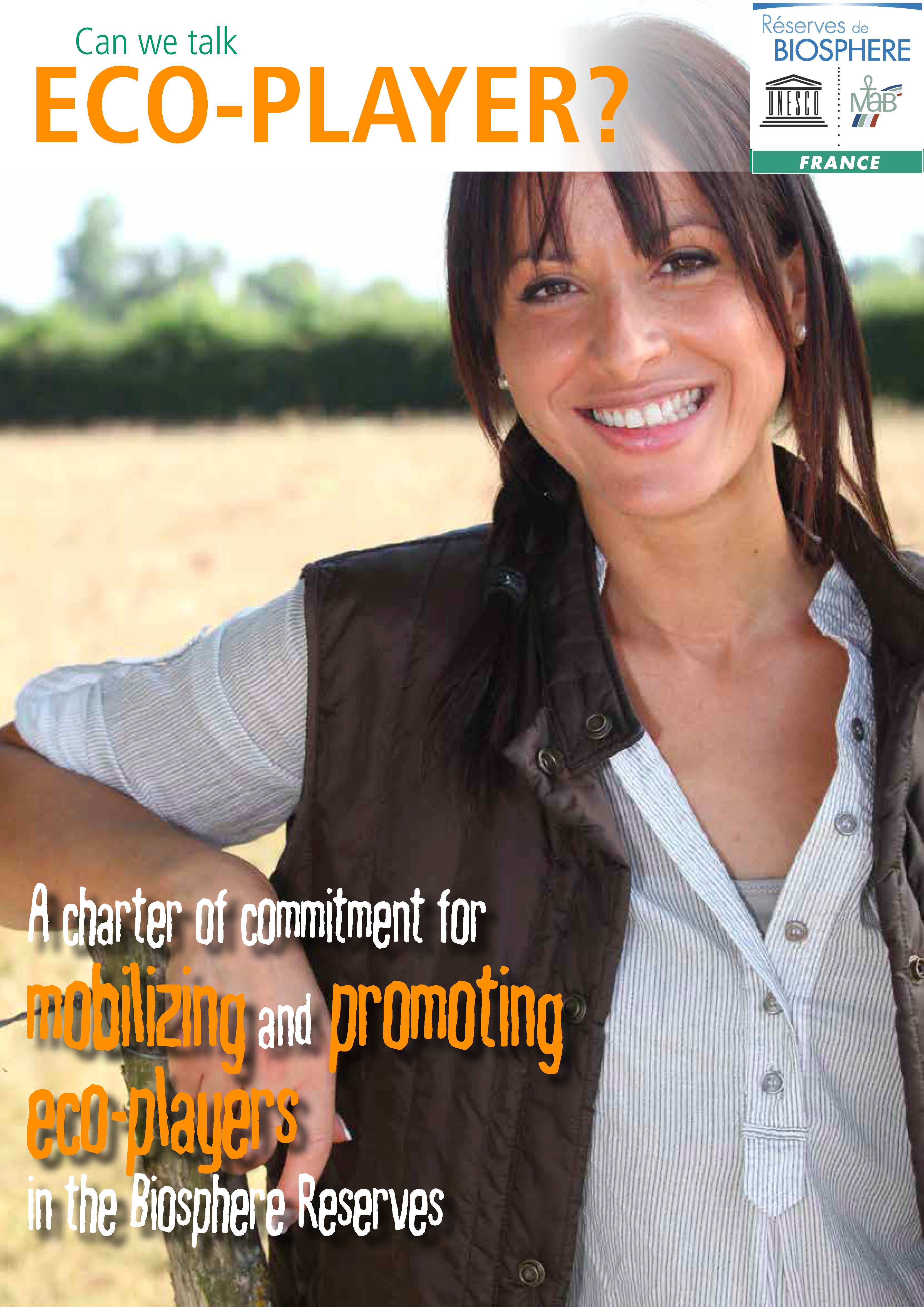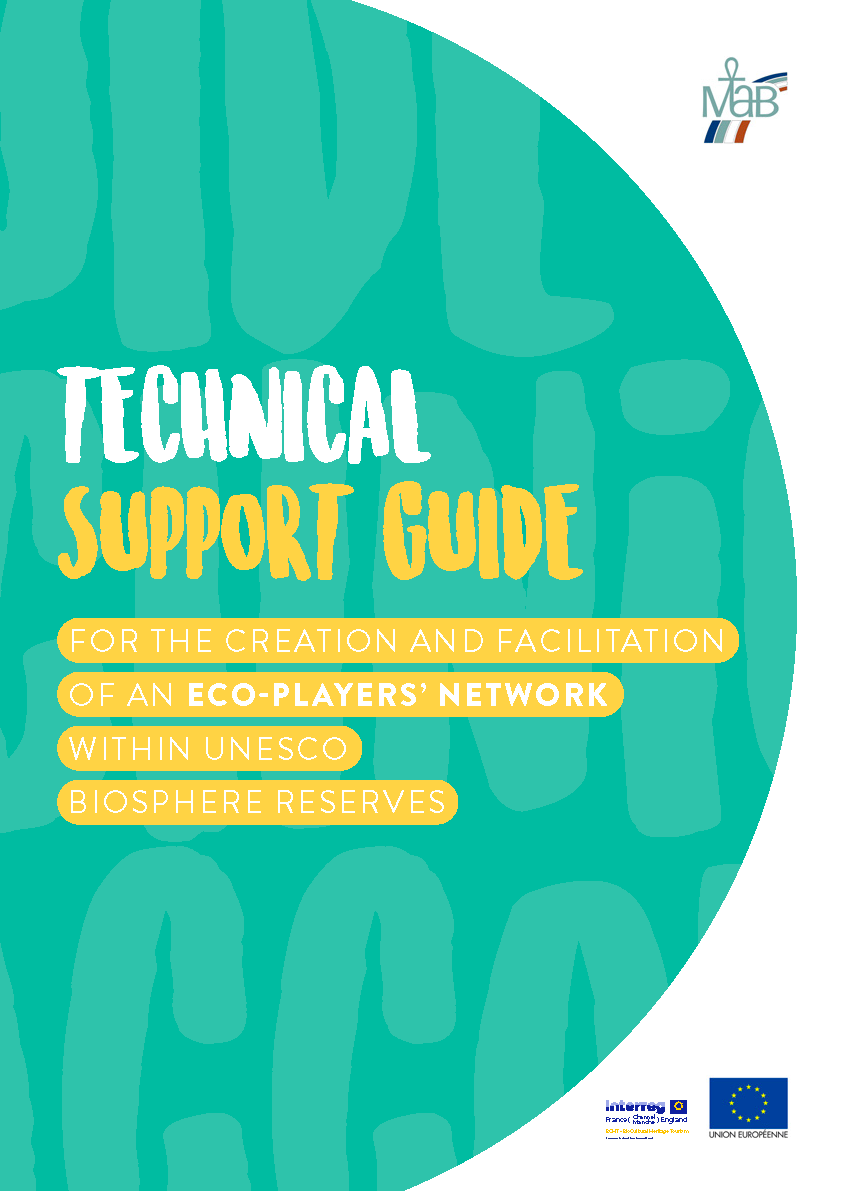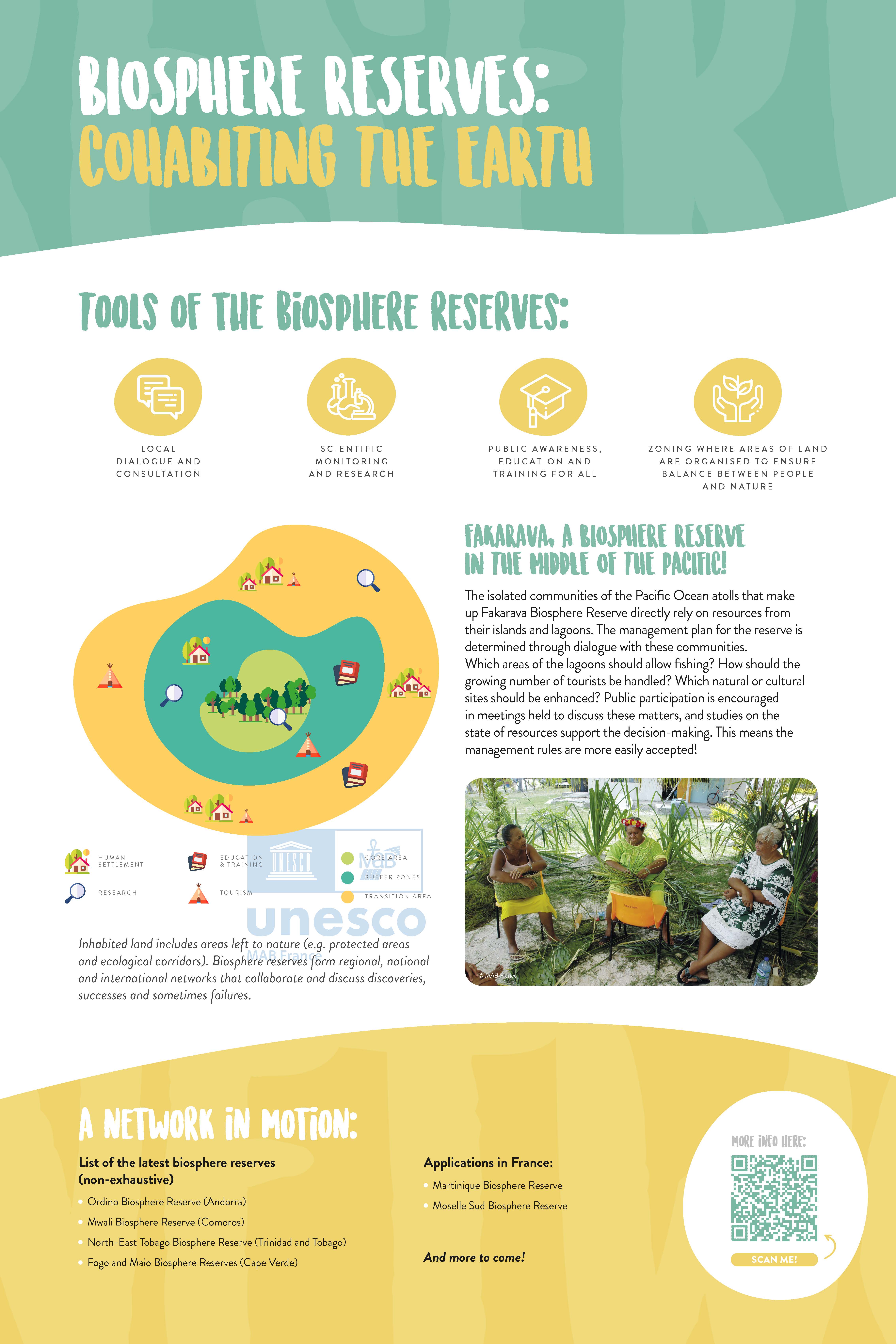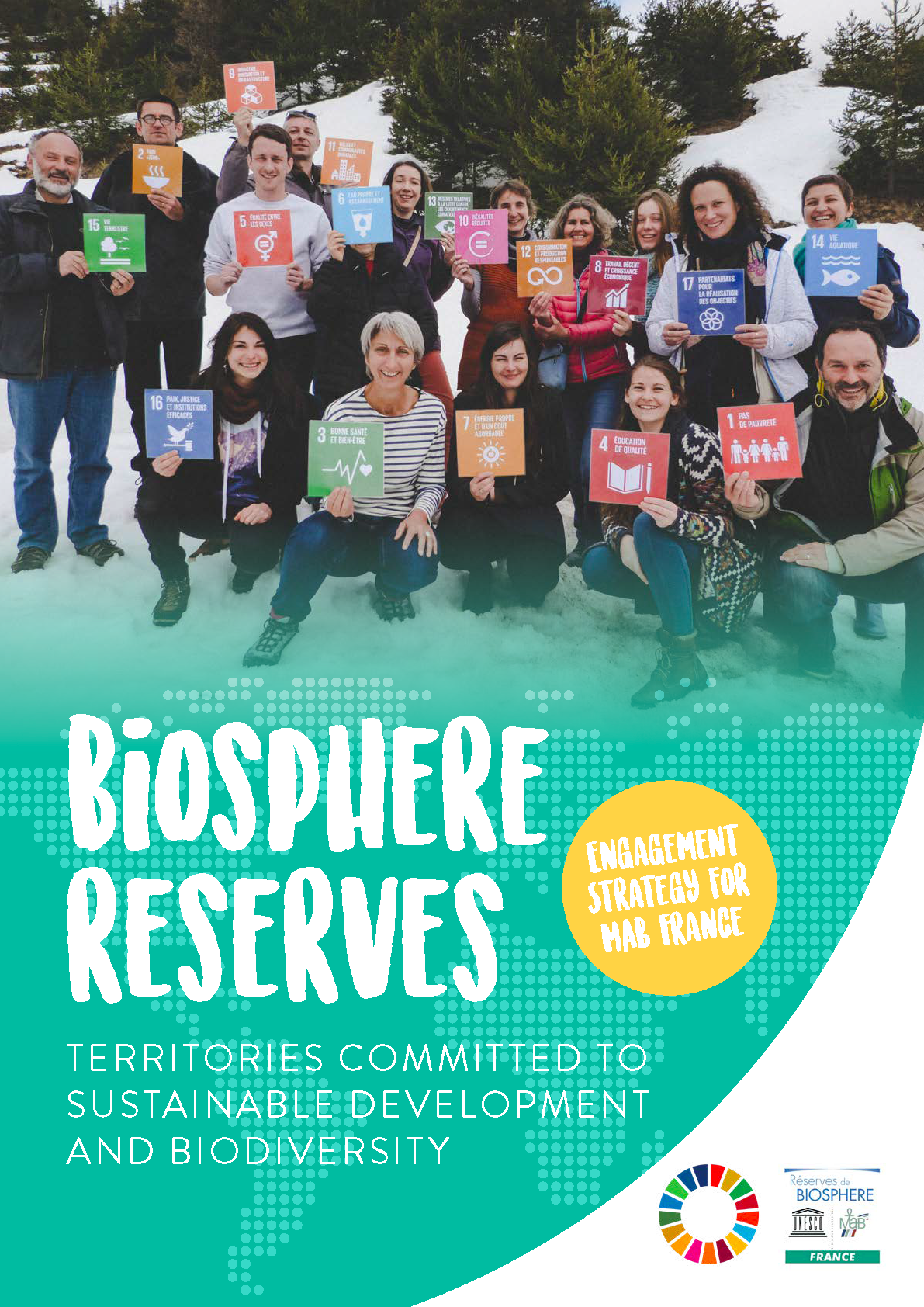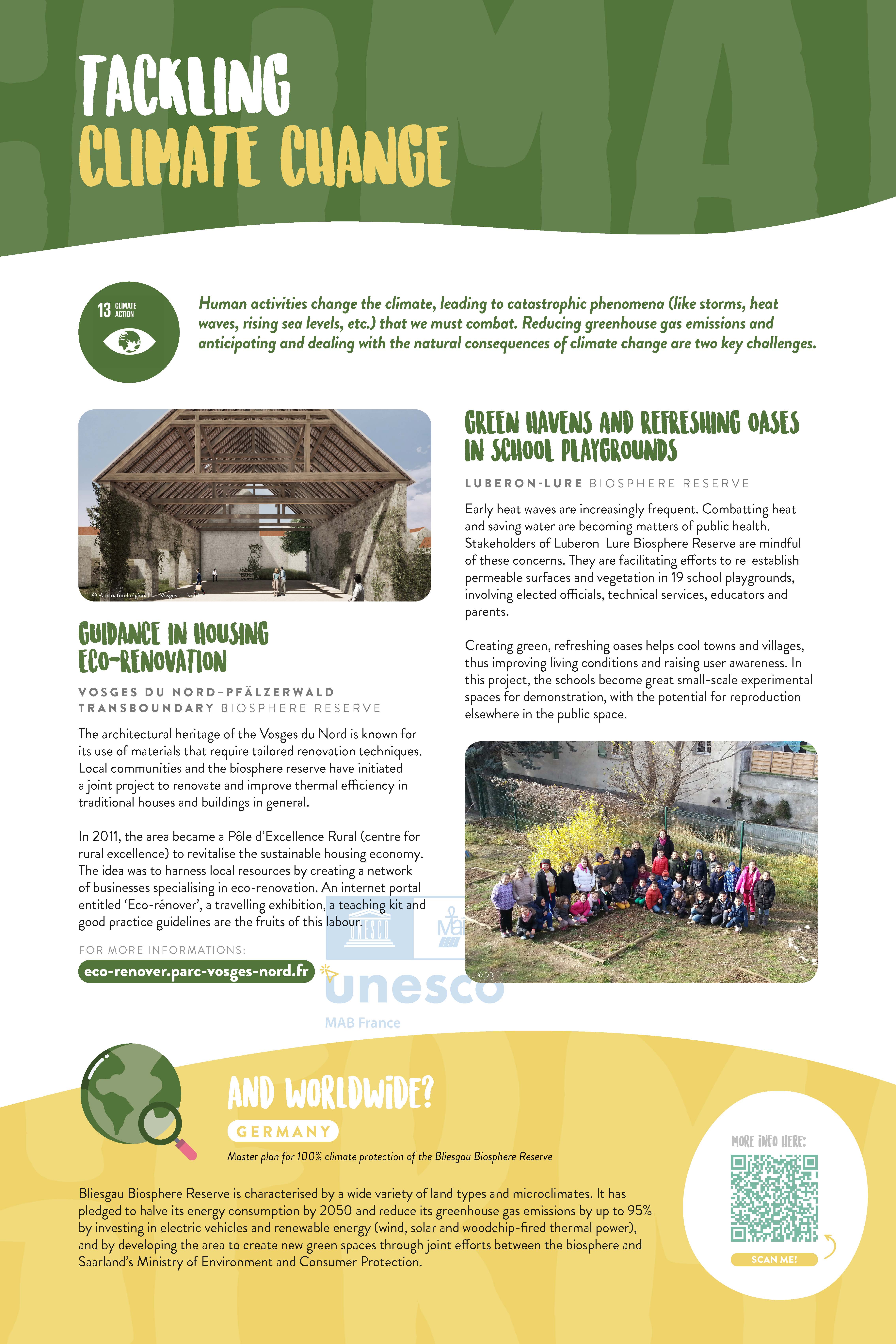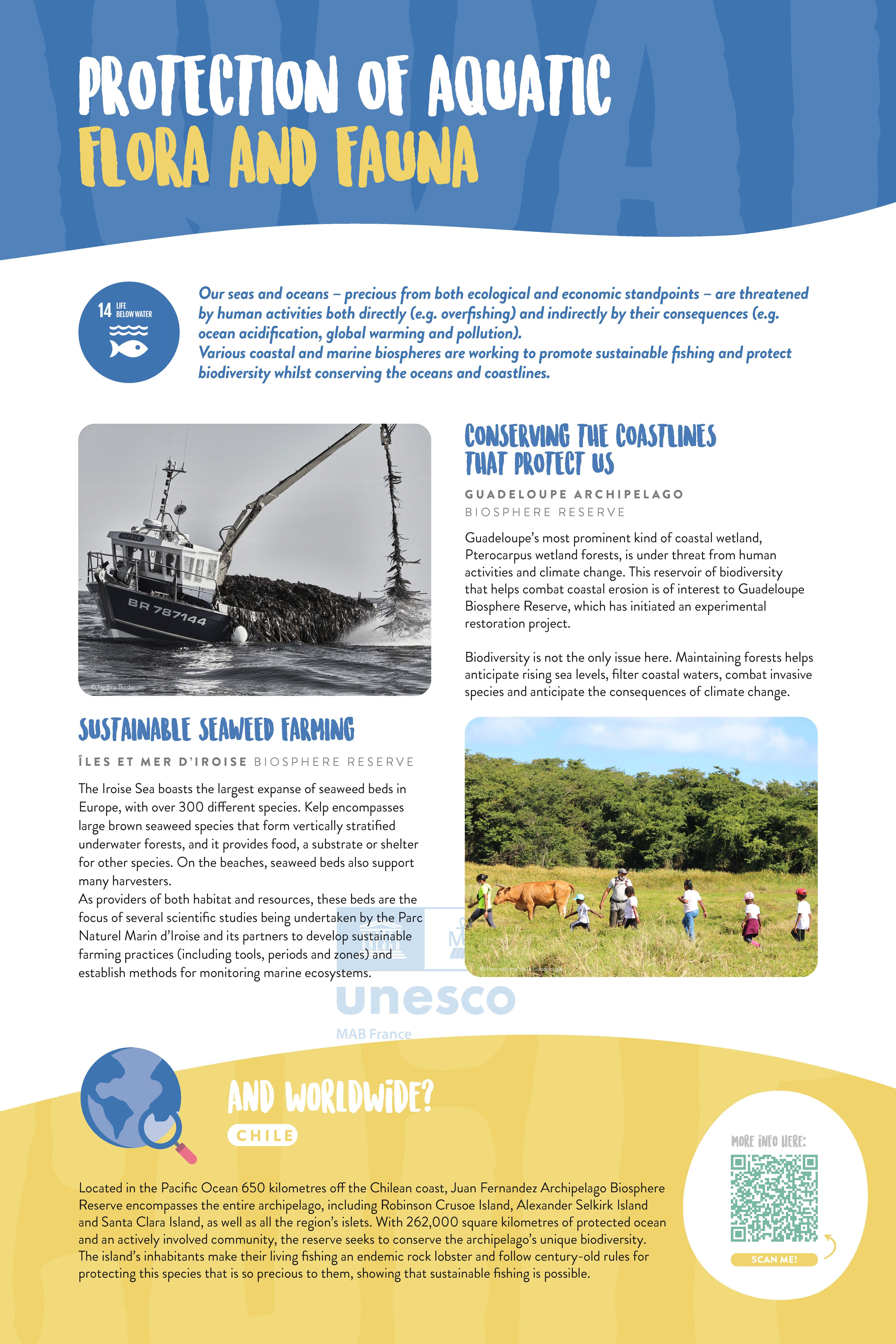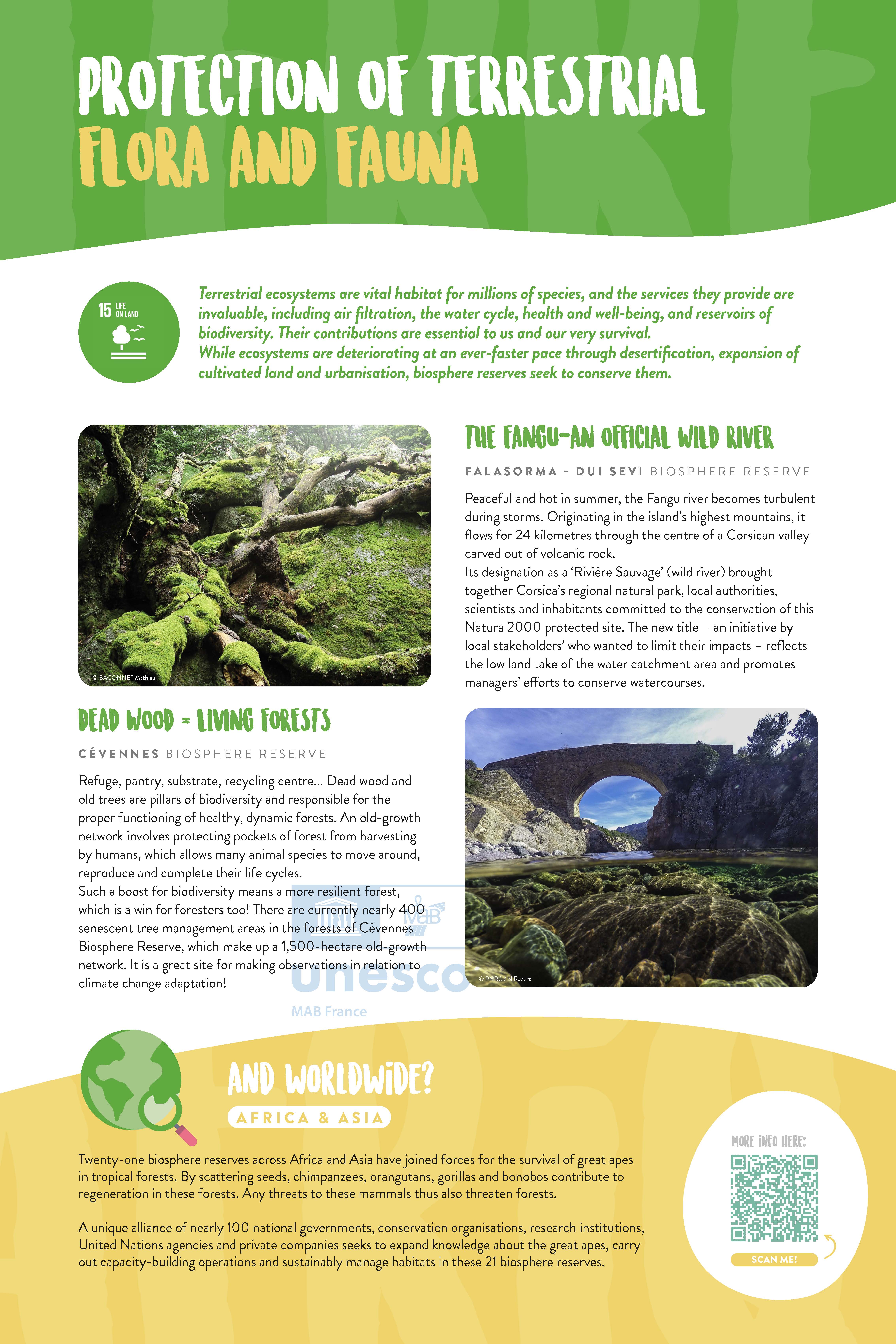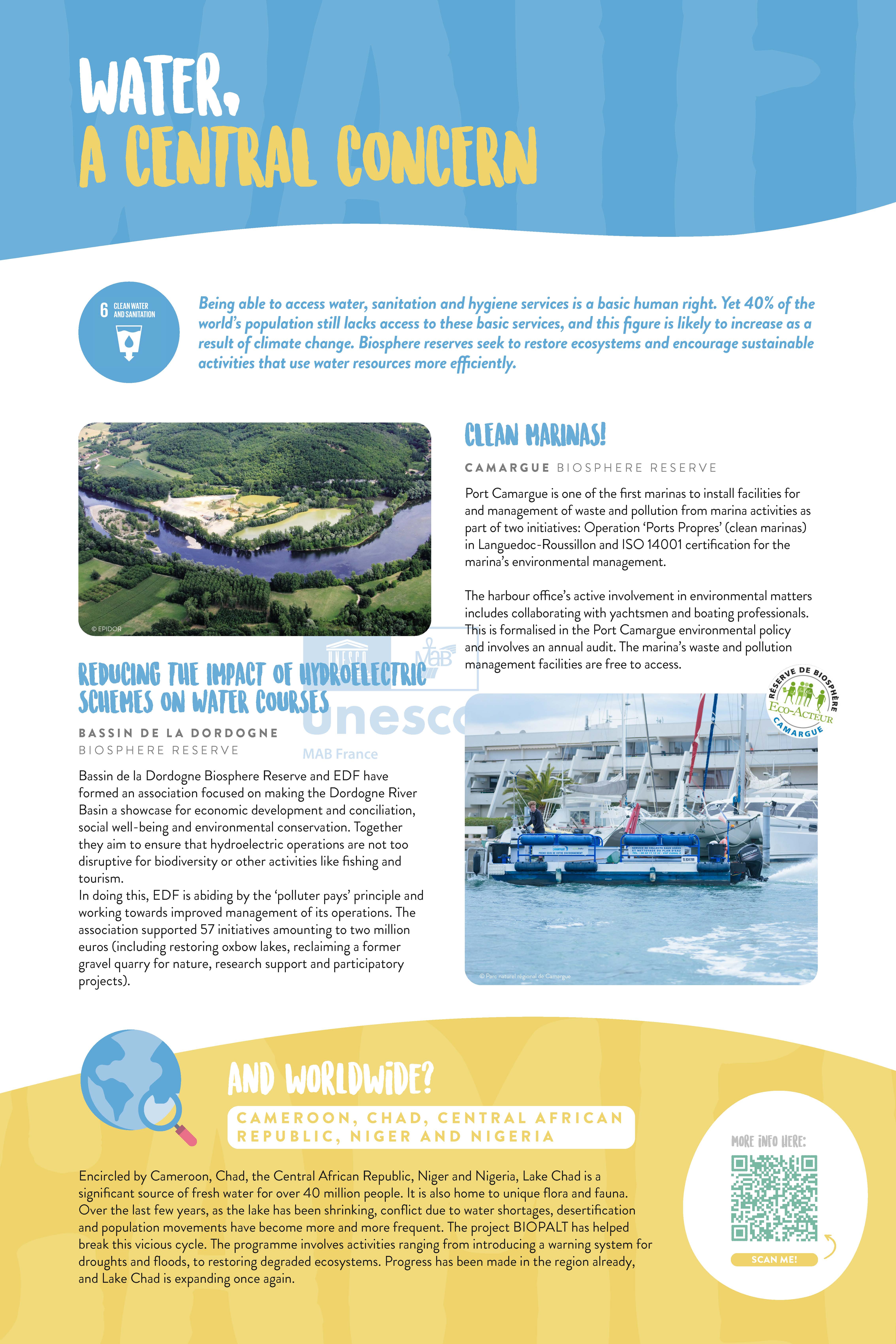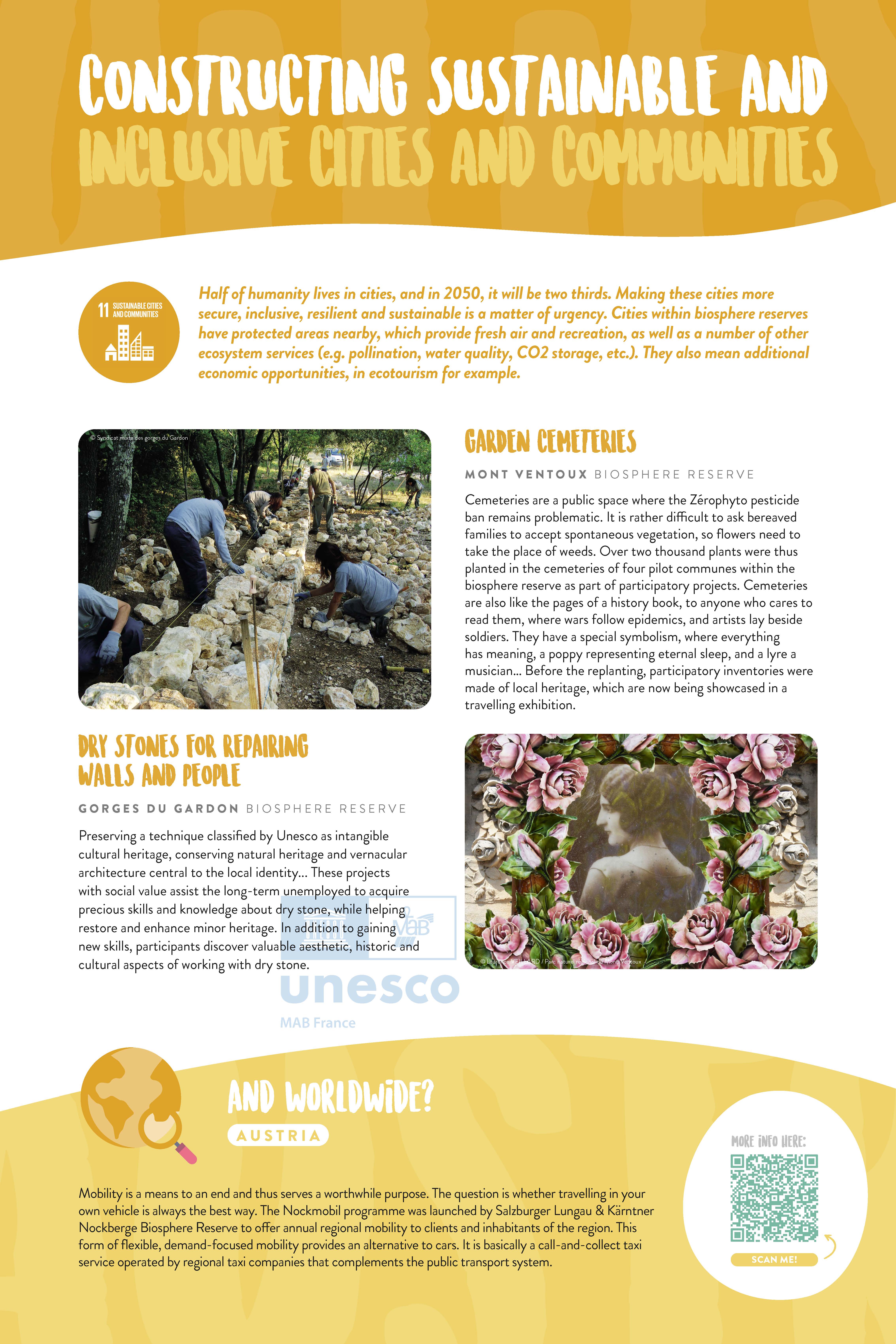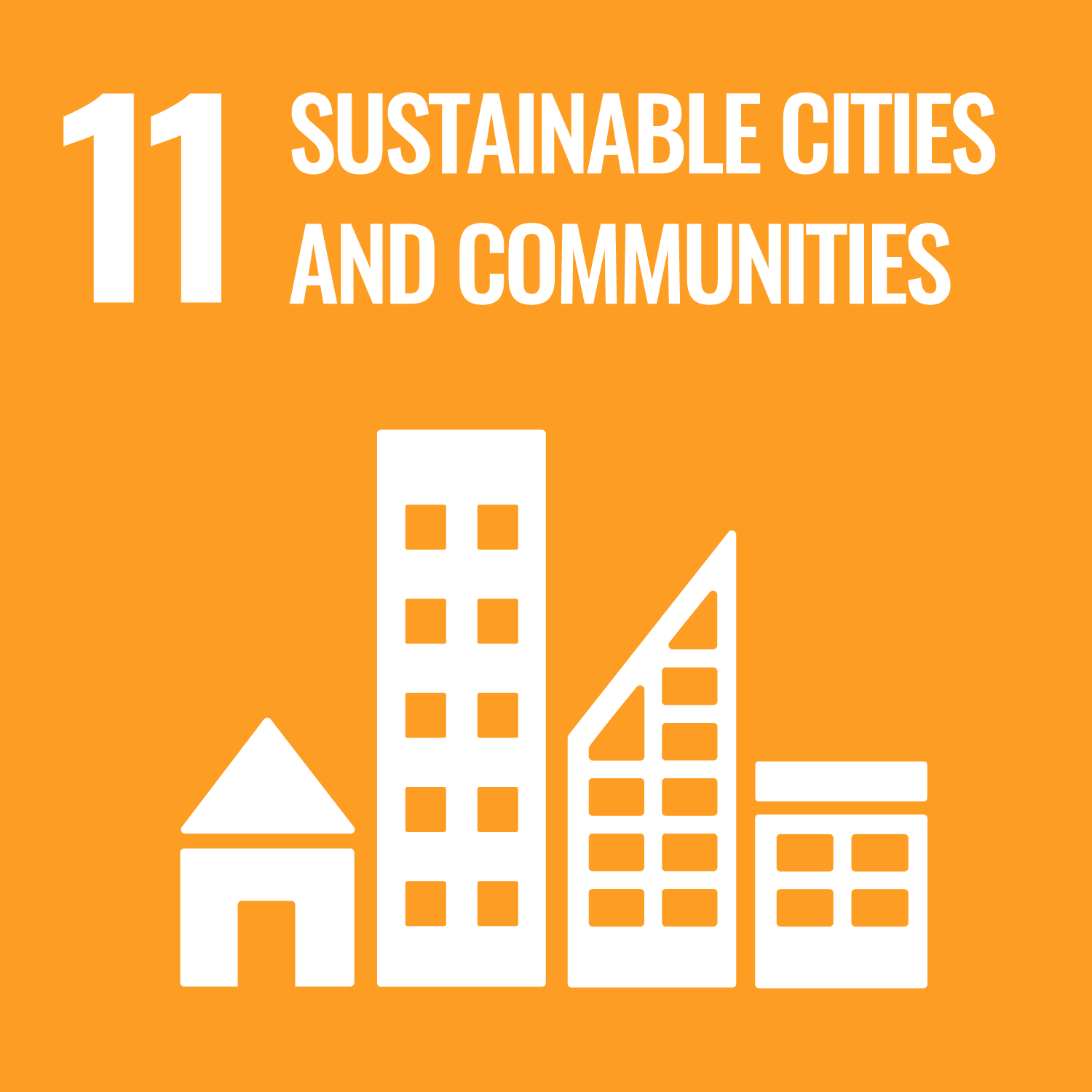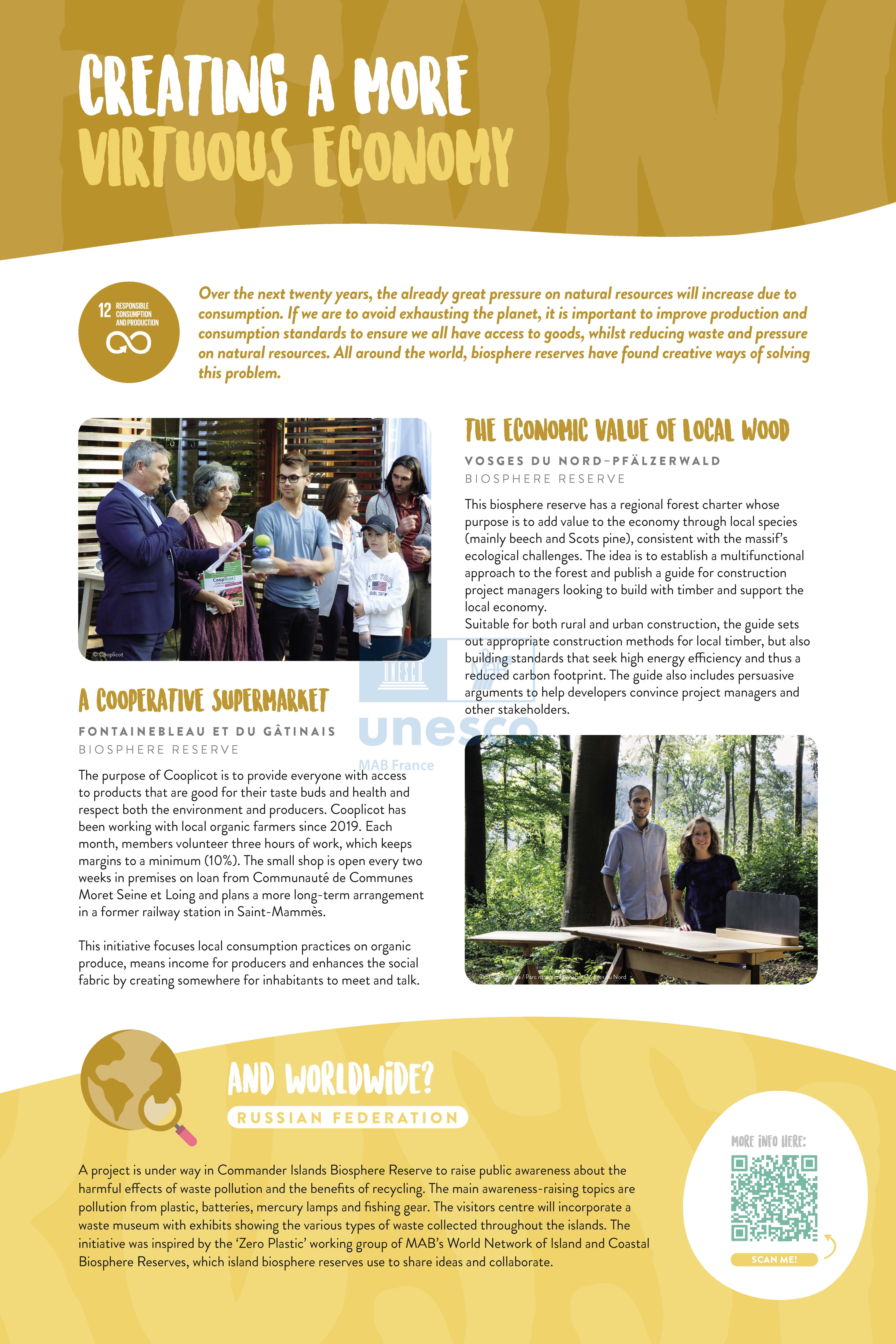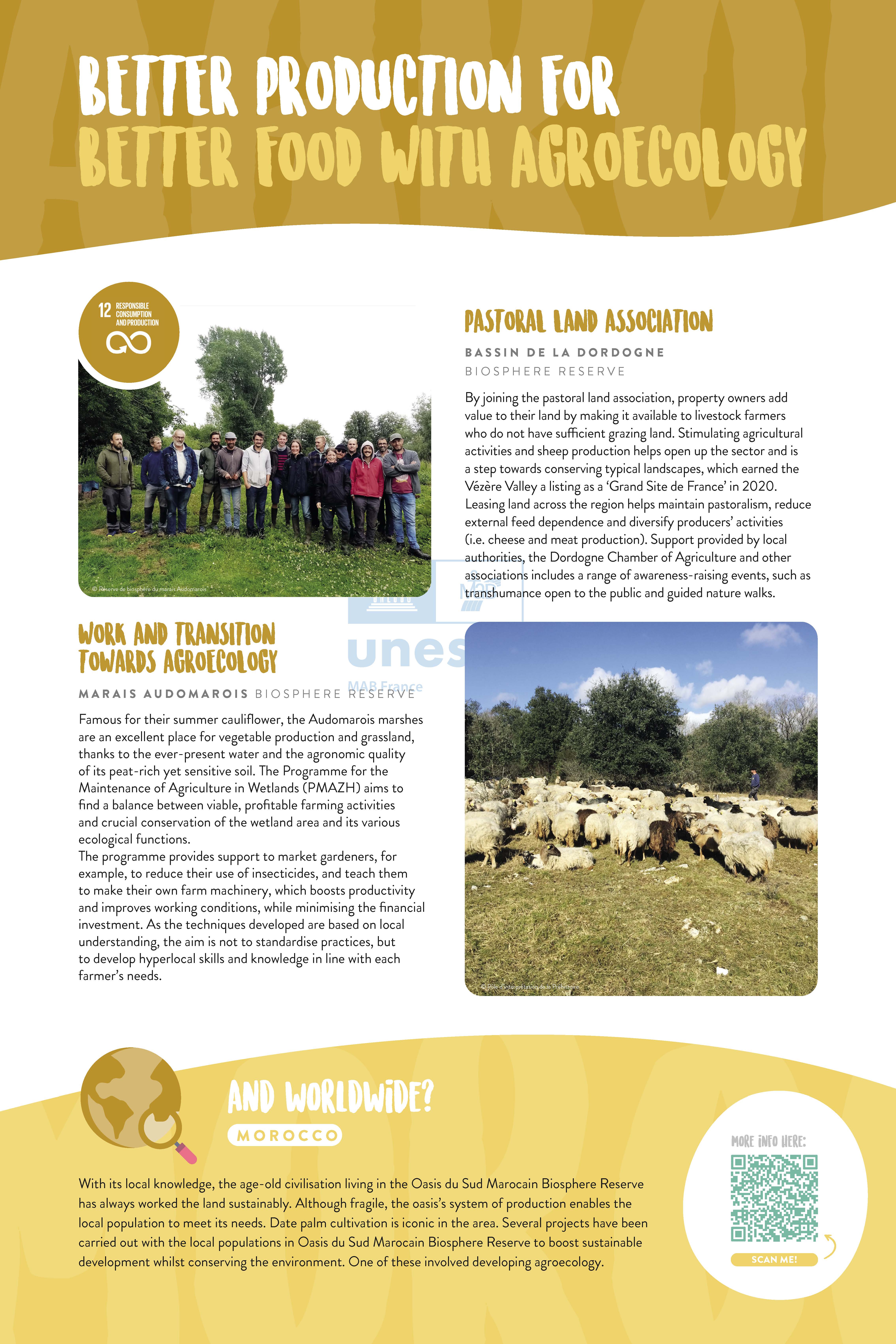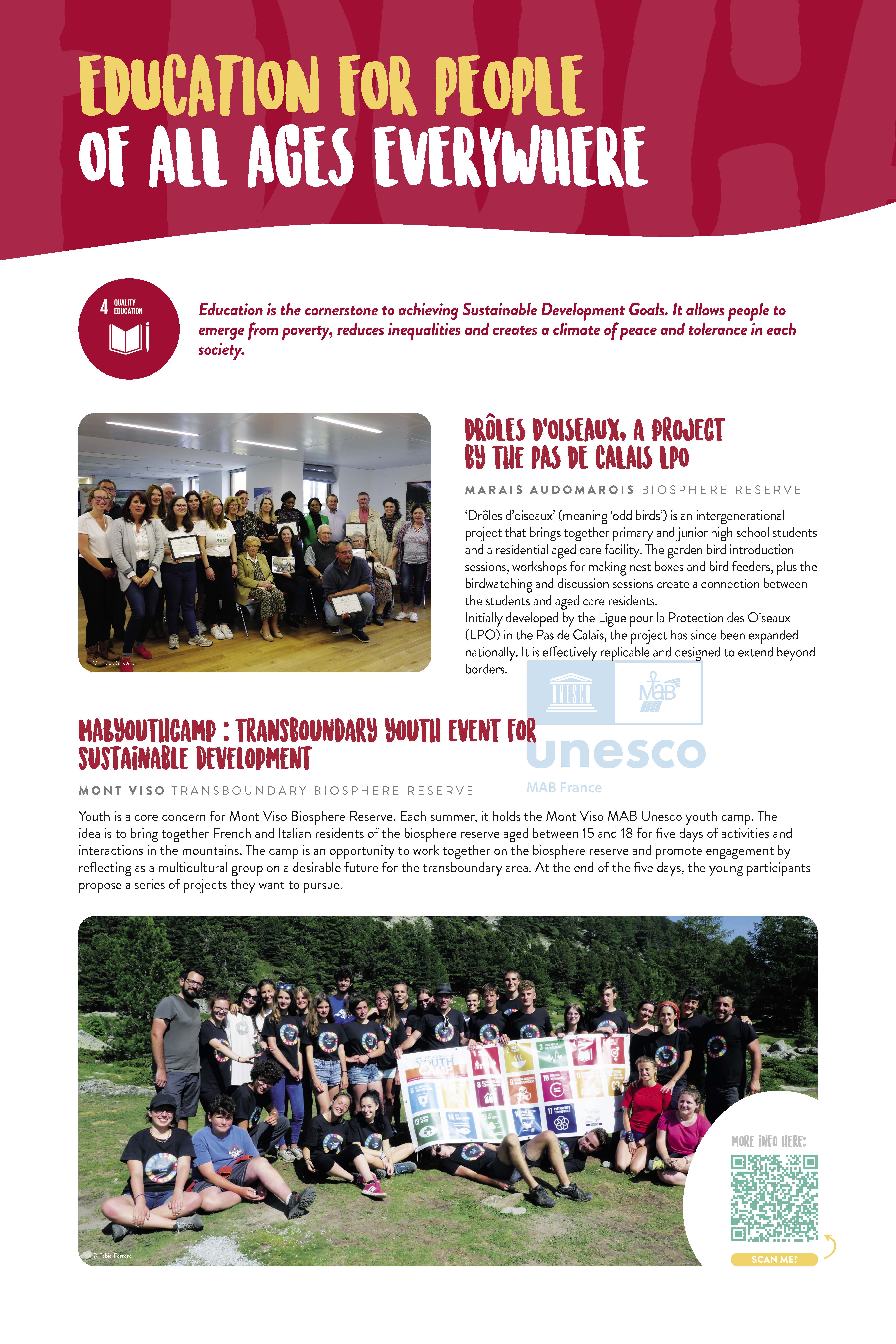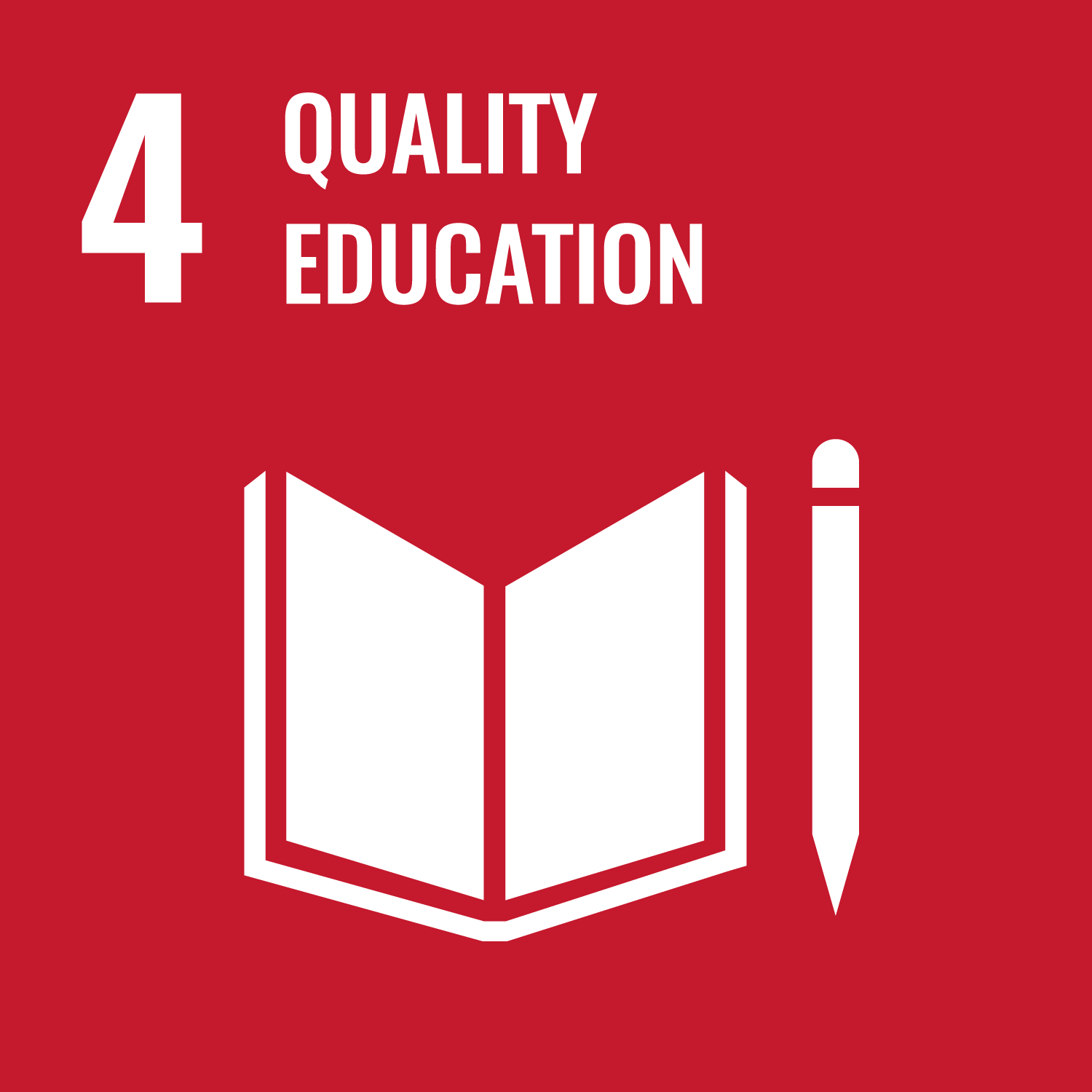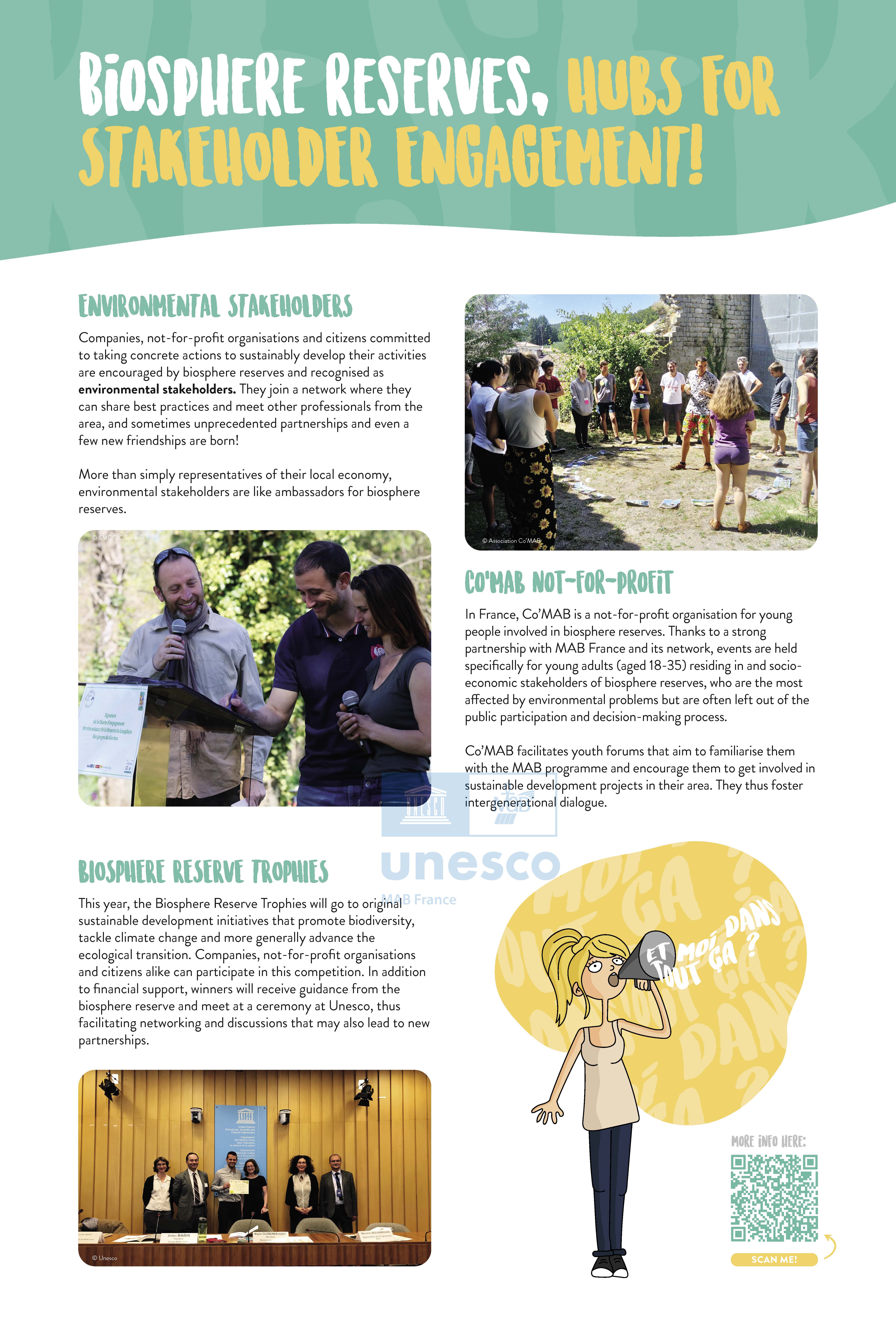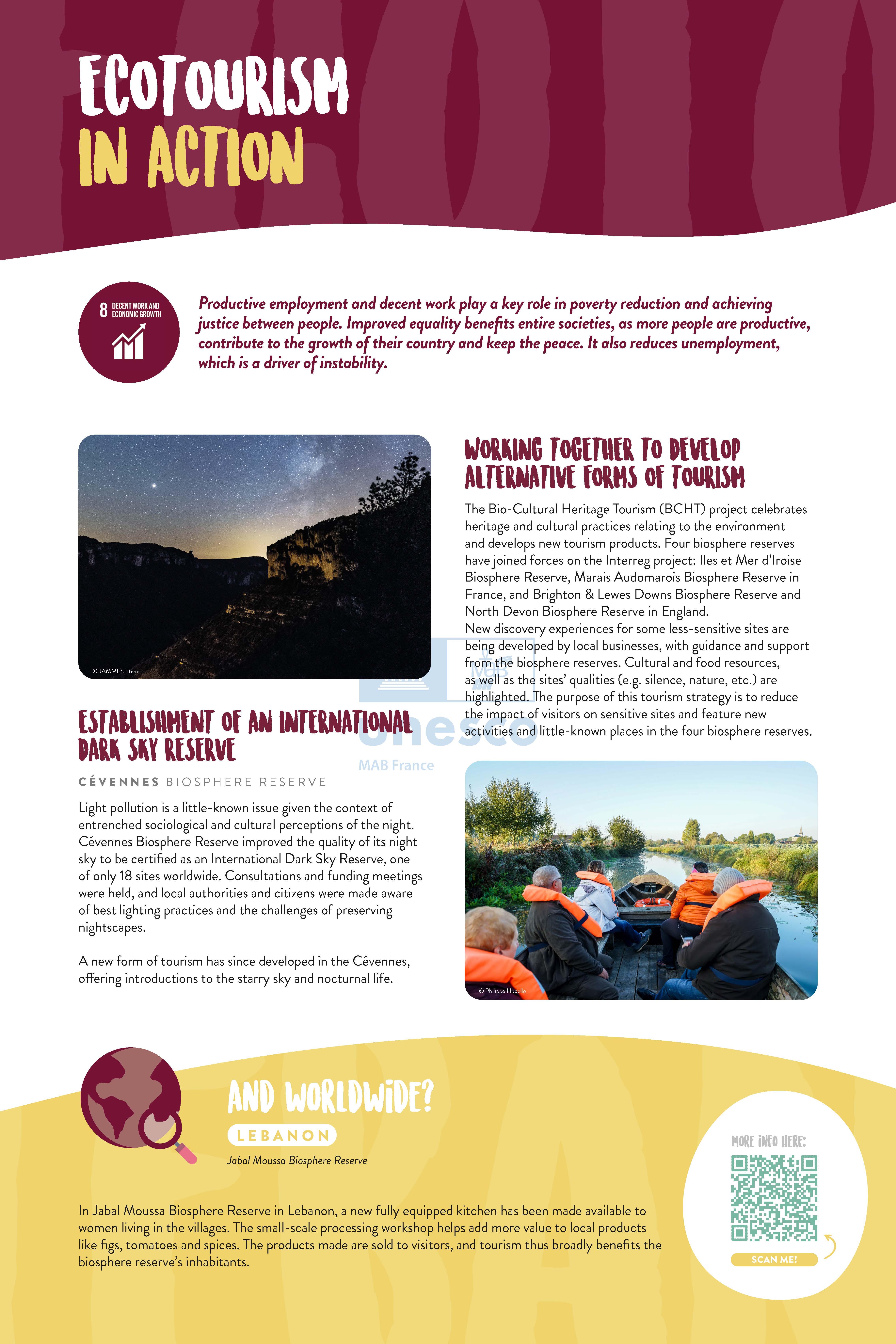Supporting Youth engagement
The last few years, a lot of efforts have been made to give a voice to the Youth in the UNESCO MAB programme. At the international scale, two MAB Youth forums have been organized. The discussions led to transformations in the governance of the MAB programme, where the Youth has now an important role to play and responsibilities at all levels. They are also engaged in Biosphere Reserves actions and projects, especially within their own Biosphere Reserve and linked to the Biosphere Reserve residents. They have now the means and power to make their voice heard internationally and in debating arenas about biodiversity conservation, climate change and sustainablity.
MAB France and the French Biosphere Reserves have been working on taking into account the Youth opinions in the governance of the regions and within the French MAB network for several years now. Several Youth forums have been organized in Luberon-Lure, the Cévennes, Marais Audomarois and Martinique Biosphere Reserves, and in the future candidate Biosphere Reserve: Brière. Co'MAB, a youth association and member of the MAB France comitee, also helps to support and facilitate participative workshops targeting young adults.
For more information about the role of the Youth in Biosphere Reserves and the MAB programme:
A video: Quelle organisation des jeunes dans les Réserves de biosphère et le MAB?
A website: MAB Youth
The MAB programme in videos
For more videos with MAB France, please visit our Youtube page: Youtube MAB France
Man and the Biosphere
Launched in 1971 by UNESCO, the ‘Man and the Biosphere’ (MAB) programme encourages interdisciplinary research, demonstration and training in natural resource management.
Its aim is to promote respect for ecological diversity and associated cultural values by involving local populations and adopting an appropriate scientific approach. It is supported by a global network of experimental Biosphere reserves. Biosphere reserves are ideal places to test and implement sustainable development practices at the regional level, while balancing social and economic development needs with environmental protection objectives.
"What does sustainable development look like where you live?"
In 2018 the global network comprised 686 Biosphere reserves in 122 countries, including 20 Transboundary sites, and new Reserves are proposed every year. MAB France coordinates and manages the French network of 14 Biosphere reserves, assists in setting up new sites, as well as liaising and cooperating with the international network.
For further information: UNESCO Ecological sciences
Biosphere Reserves in a nutshell
The French MAB Committee was established to oversee the Man and the Biosphere programme in France, with the support of the French Agency for Biodiversity. Managing and strengthening the national network of Biosphere reserves, the Committee liaises and develops collaborations with both French and international communities interested in the programme (e.g. scientific, educational, management and conservation of biodiversity).
Managing the network of Biosphere reserves
- MAB facilitates the exchange of experience and information, as well as developing joint projects between Biosphere reserves by creating and managing cross-cutting networks
- Biosphere reserves annual meetings
- Thematic groups: Pedagogy Group, Forest Group, Communications Group, Charter Group
- Participation in university courses
- Produces and disseminates information on Biosphere reserves: the French ‘Biosphere Letter’, fact sheets on Biosphere reserve activities (pdf), Biosphere reserves general fact sheets (pdf), Biosphere reserves technical notes, a practical guide to management, the website Agir pour la biodiversité (Act for biodiversity), etc.
Strengthening the French network of Biosphere reserves
- MAB France assists in the creation of new Biosphere reserves
- Supports French biosphere reserves during the periodic reviews conducted every 10 years
- Provides scientific and technical support to the network of Biosphere reserves and participates in their various bodies.
Developing international collaborations
The MAB Committee and French Biosphere reserves actively participate in the regional EUROMAB network that includes the MAB committees and Biosphere reserves of Europe and North America. The network meets regularly, organizes training courses and the exchange of best practices and experience.
Other collaborations exist, including with Biosphere reserves in French-speaking Africa. Many French Biosphere reserves have lasting partnerships with sites overseas.
Biosphere reserves are great living libraries of experience in all areas of sustainable development. Membership in the World Network facilitates the establishment of partnerships, and the organization of exchanges in various forms, and promotes best practice, distribution of documents, teaching materials and films.
Conferences and training are also supported by UNESCO.
What does sustainable development look like where you live
To learn more about the World Network of Biosphere Reserves
A guided process
Creating or reviewing a Biosphere reserve is an ideal opportunity to conduct a comprehensive assessment of the region’s problems. It is a moment of exchange between stakeholders, of learning and of reconciling differing views on the operation and future of the site. Documents need to be compiled for submission, including any statutory elements. Before the submission is drafted, the process, led by the project manager, requires a series of key stages to be completed. Each stage is necessary in order to find points of agreement and ways to engage stakeholders. The partnerships that are formed are essential to the life and organisation of a Biosphere reserve.
Co'MAB
The Co'MAB association brings together the current and graduate students of the MAB Master and all those interested in its activities.
Co'MAB projects
- Promote the Man and Biosphere (MAB) Master's degree from the University of Toulouse, as well as the values promoted by UNESCO's Man and Biosphere Programme
- Facilitate the orientation and professional integration of former and current MAB Master students.
- Encourage feedback and sharing of good practices within the community.
- Represent the MAB Master at events and conferences, give more visibility to the training.
- Establish cooperation projects and partnerships with other youth associations or organizations involved in the MAB Programme.
- Set up sponsorships between promotions, in order to best welcome the new Master students
Biosphere Reserves encourage socio-economic actors who take initiative in support of the environment and sustainable development, using specific mechanisms. Thus making it possible to identify concrete actions taken by businesses, associations, citizens, and to support original projects. This contributes to the ecological transition in a positive way, by building on local initiatives and establishing networks of ambassadors (eco-players) in the Biosphere Reserves.
A charter of commitment
It is proposed to sign a commitment charter to companies or associations that, recognizing themselves in Unesco's values, wish to be actors in a more sustainable future for their Biosphere Reserve. They make concrete and measurable commitments in terms of biodiversity, environment and sustainable development, as part of a process of progress. They then become Eco-players of the Biosphere Reserve. Doing so, they contribute to the economic and social development of the territory.
How to build a network of eco-players
The process for setting up a charter of commitment and building a network of eco-players in Biosphere Reserves is detailed in this document: I-Blio online
The commitment charter is based on the principles of the Seville Strategy and the challenges and expectations of the territory. One becomes an eco-player by signing the commitment charter of their Biosphere Reserve. This implies sharing the BRs' values and committing to a progress process. Each signatory determines, in its own activity, commitments that correspond to the extent of progress to be achieved. All types of activities are concerned by the commitment charter.
A technical support guide
This guide is a proposed methodology for creating networks of stakeholders committed to sustainable development in Biosphere Reserves (BRs) and beyond. It is intended to be adapted according to the local context, the resources (human and financial) available for project implementation and the organisation’s affinity to participatory approaches. It provides best practice for creating a charter, based on the feedback of two French and two English BRs.
Download the guide
test
The French Biosphere Reserves
Currently, there are 16 French Biosphere Reserves, including three overseas sites (the Guadeloupe archipelago, the municipality of Fakarava in French Polynesia, and the Martinique Biosphere Reserves) and 2 Transboundary Biosphere Reserves (the Vosges du Nord-Pfälzerwald with Germany, and Mount Viso with Italy).
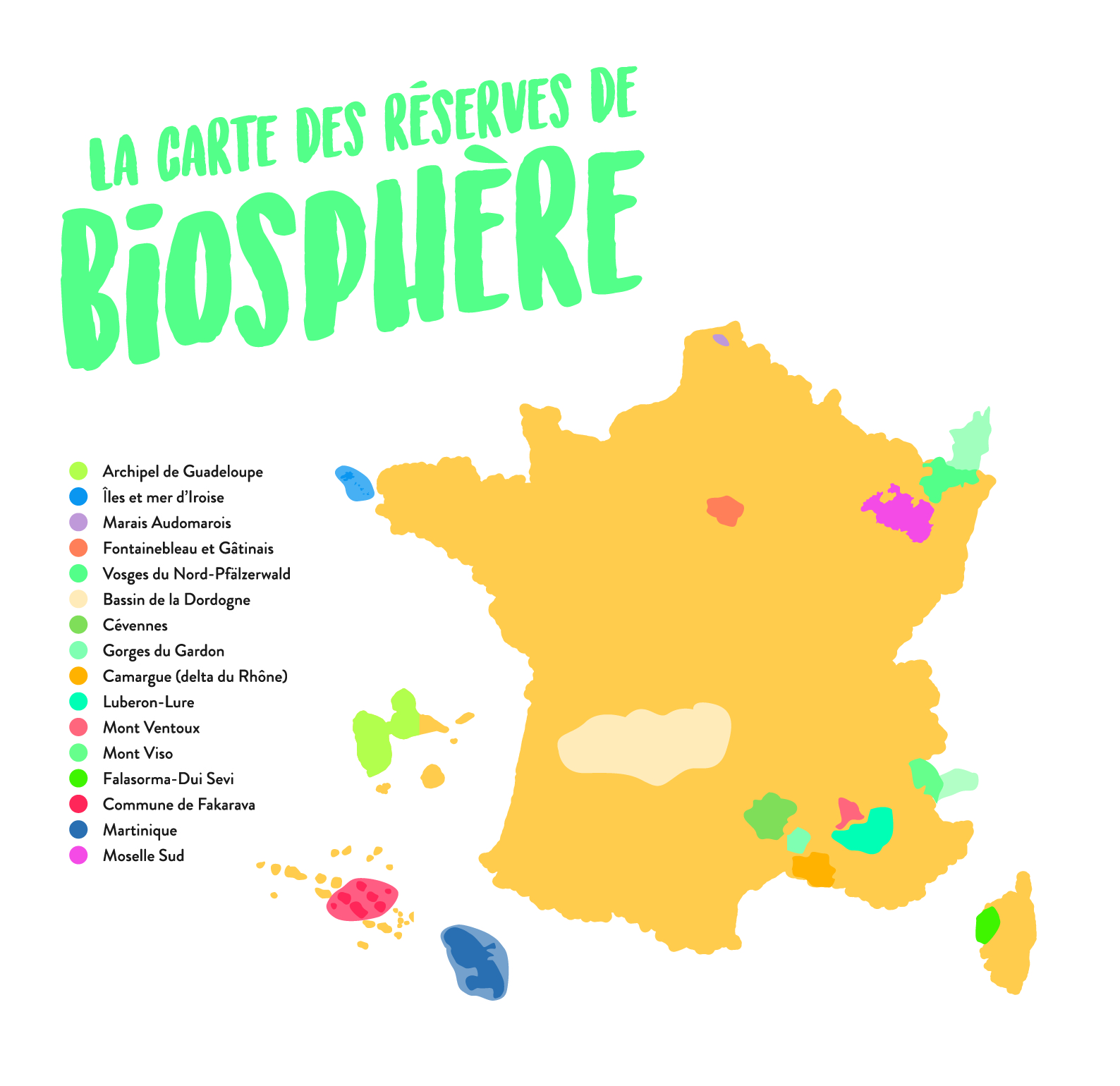
Businesses or associations that identify with UNESCO values and wish their Biosphere Reserve to be part of a more sustainable future can sign a commitment charter. They make concrete and tangible commitments in the field of biodiversity, the environment and sustainable development, as part of a continuous improvement strategy. They then become eco-players of the Biosphere Reserve. In this way, the Reserve contributes to the social and economic development of the territory.
How to build up a network of players
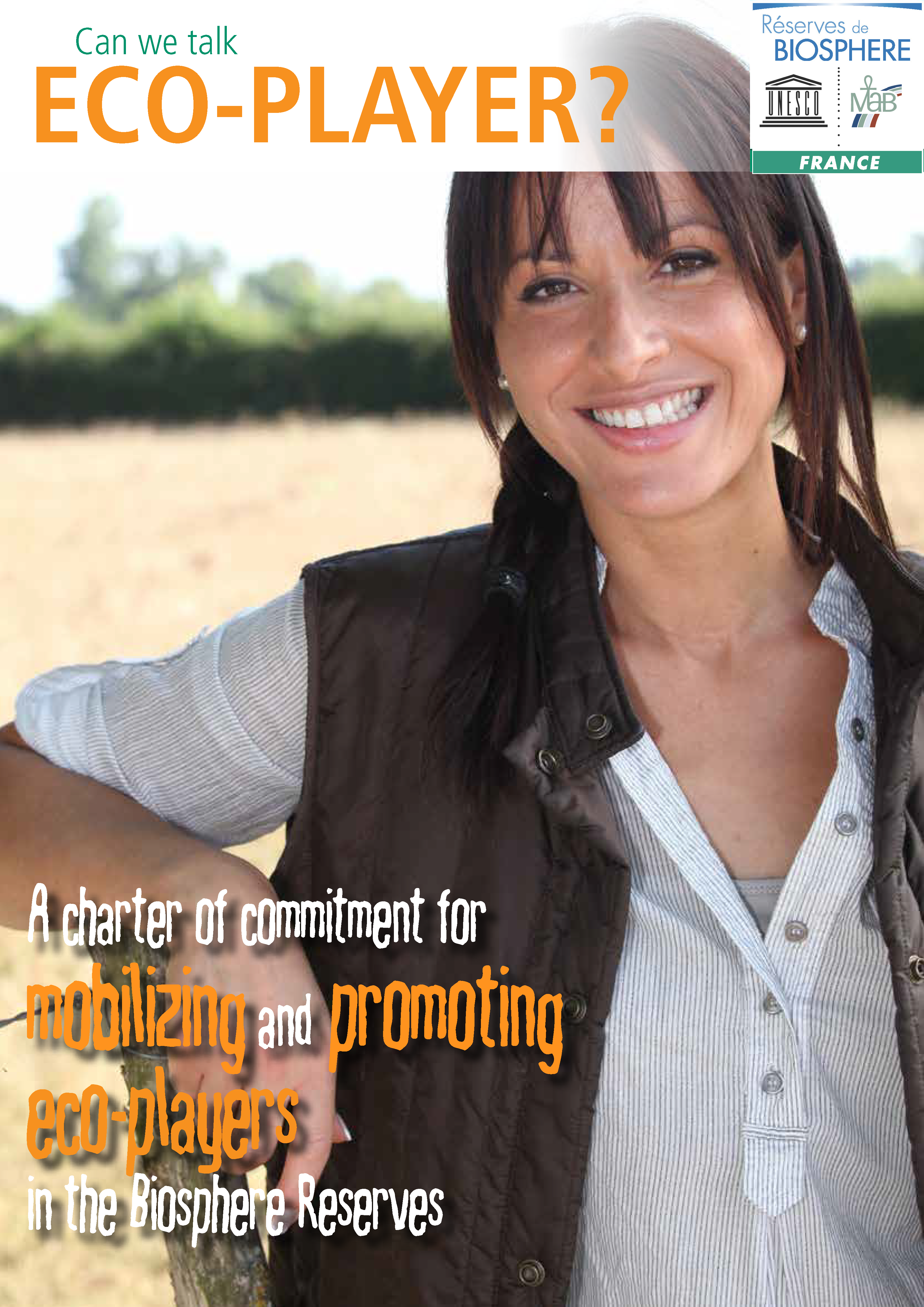 All the aspects of the approach to establish a commitment charter and create eco-player networks are presented in this i-blio
All the aspects of the approach to establish a commitment charter and create eco-player networks are presented in this i-blio
The charter is based on the principles of the Seville Strategy and on the challenges and expectations of each territory. People or structures become eco-players by signing the commitment charter and committing to a progress strategy. Each signatory defines the commitments corresponding to the progress to be accomplished in its own domain. The commitment charter concerns all types of activity.
The MAB France Committee and the Paul Sabatier University of Toulouse are proposing a MAB course in the master's degree in biodiversity management at this university.
This is a French-speaking master's degree aimed at providing professional training for coordinators / managers of Biosphere Reserves or protected areas, local authority officials, or any other person interested in biodiversity management.
The MAB Master's degree
is aimed in particular at people wishing to complete a 5th year of university education, or in continuing education. It can accommodate up to 18 students per year.
The courses are held from September 15 to January 31 at the Paul Sabatier University in Toulouse, followed by a 6-month professional assignment in a professional institution of the student's choice.
The Master's degree is based on the MAB programme to cover the conceptual, historical, institutional and contractual aspects specific to protected areas associated with human activities.
It will provide essential diagnostic tools (mapping, inventories, territorial diagnosis) and will train people to participate and involve them in management. Students will also be involved in a concrete project to create, revise or manage a French Biosphere Reserve. Foreign students will be asked to complete this work by reflecting on an adaptation of the approach used in a Biosphere Reserve in their country.
The MAB Master's degree is a UNESCO Chair.
The former students of the master's degree are grouped in the Co'MAB association.
International Master Programme „Biosphere Reserves Management“.
This study programme focuses on UNESCO’s World Network of Biosphere Reserves and its great potential for sustainability transformation.This study course wants to educate future Biosphere Reserve managers and actors, and promote intercultural exchange, integrate natural- and socio-scientific approaches, and work together with practitioners from UNESCO-Biosphere Reserves around the world.
More information: Eberswalde University for Sustainable Development
A working group on youth has been set up to facilitate exchanges of experience between managers of French Biosphere Reserves. The aim of this group is to better integrate all generations into the governance and life of these territories. The main focus is on mobilizing young adults, aged 18 to 35, an audience that is particularly difficult to reach.
By promoting intergenerational exchanges and the involvement of young people (18-35 years old), the Gener'action Group aims to boost the territories and thus contribute to the Sustainable Development Goals highlighted by the MAB France strategy. This group is led by the Co'MAB association
Biosphere Reserves trophies
Each year, the Biosphere Reserve trophies identify and reward the initiatives of local eco-players. They promote original initiatives undertaken by the Biosphere Reserve players in the domain of sustainable development. These trophies recognize the commitment of eco-players in favour of the sustainable management of biodiversity and natural resources, in combatting climate change and more generally, encouraging sustainable development. They also contribute to setting up exchanges and partnerships between the Biosphere Reserves and these players in order to encourage the organization of networks. The trophies give rise to a mediatized event, adding a positive and concrete perspective to the action of the Biosphere Reserves.
About the winners
©Les Bédégars
The winners of the Biospshere Reserves
Is “Biosphere Reserve” a UNESCO classification?
Yes, the designation “Biosphere reserve” is a UNESCO classification, but it’s more than that. The process involves a proposal of a suitably high standard, which must meet internationally accepted criteria.
However, it is not just a simple classification; it also involves establishing a local sustainable development project, specific objectives, and a means of measuring the results.
This is in line with the Seville Strategy, whose recognized management principles are applied. This includes zoning and complementarity of the three functions of Biosphere Reserves: conservation, development, and support through research, education, and local community involvement. Above all, a “Biosphere Reserve” strives for excellence in the application of these principles, as well as a strong commitment towards sustainable development.
Designation as a Biosphere Reserve also ensures membership in the global network of Biosphere Reserves, and consequently, a role in one of the regional networks. This membership brings benefits, such as the experience of other members, having a network of partners ready to assist as needed, and being able to share views on management issues. Membership also brings with it obligations, that is, exchange of information and participation in joint projects.
More information about Biosphere Reserves: Biosphere Reserves in a nutshell
What is the difference between a Biosphere Reserve and a World Heritage Site?
Inclusion on the World Heritage List indicates a site’s outstanding universal value. The designation of a Biosphere Reserve is a dynamic process that involves local stakeholders creating and supporting a sustainable development project in their region, applying globally recognized management principles, as outlined in the Seville Strategy published by UNESCO in 1995. Designation as a Biosphere Reserve also ensures membership in a global network of exchange and cooperation between designated sites, motivated by shared principles.
More information: A quick reference guide
What does the MAB France committee do?
MAB France coordinates and manages the French network of 10 Biosphere Reserves, assists in setting up new sites, as well as liaising and cooperating with the international network.
On the fiftieth anniversary of the MAB program, MAB France has produced an exhibition on the topic of "Coexisting with the Earth". It presents some emblematic actions carried out by the French biosphere reserves and which contribute to the achievement of the Sustainable Development Goals. It also highlights international examples and illustrates the diversity of the World Network of Biosphere Reserves.
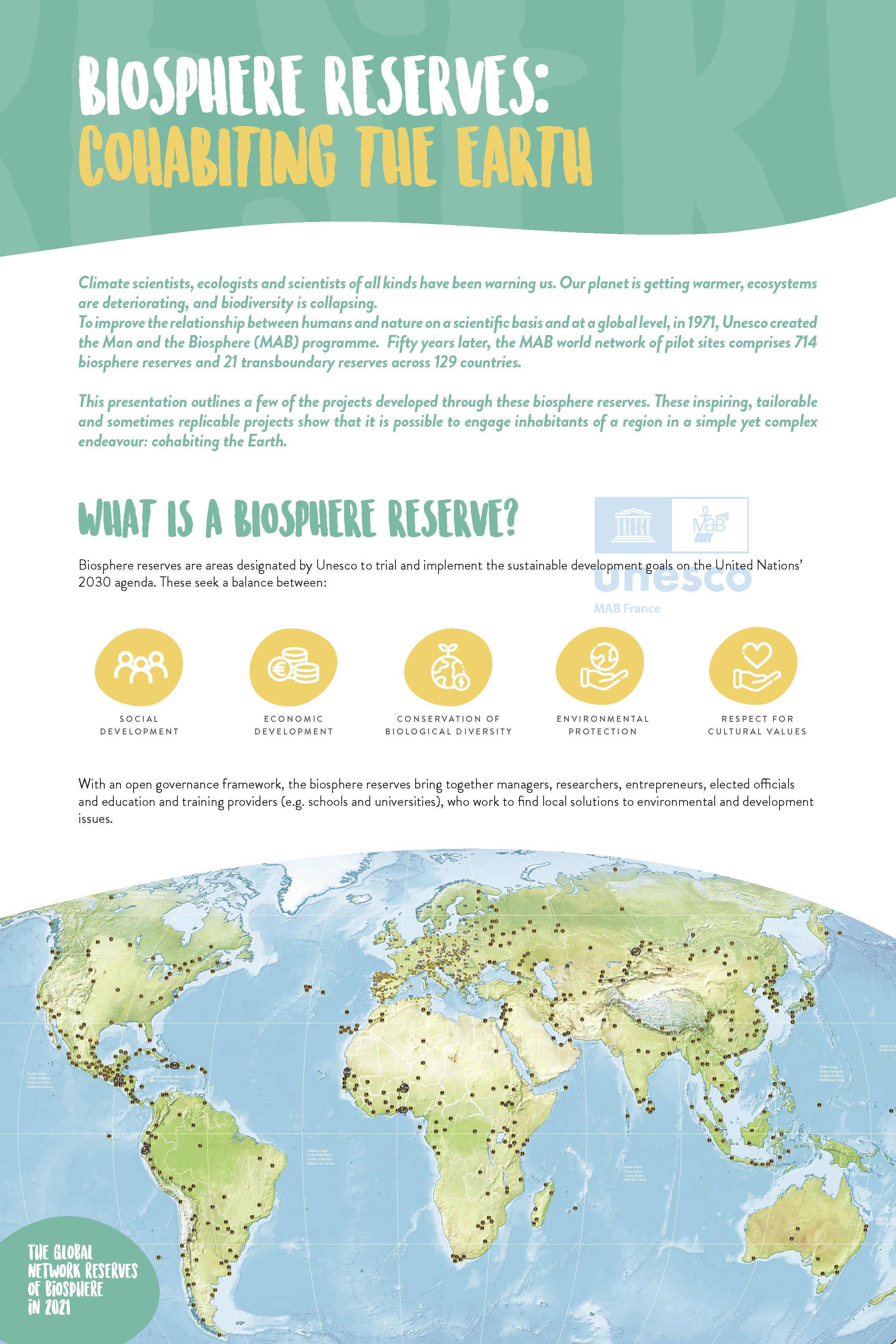
All PDF files of the exhibition are also available for printing and display upon a simple request to MAB France.
Transboundary Biosphere Reserves have been established to recognize and strengthen coordinated management of socio-ecosystems across borders: political, organizational, linguistic, cultural breaks, and barriers to the management of shared ecosystems and the development of populations. They promote the coordinated management of these ecosystems, often also the place of a common history and culture.
A Transboundary Biosphere Reserve is first and foremost a cooperation between established Biosphere Reserves. UNESCO formally designates it as a Transboundary Biosphere Reserve if certain conditions are met: a political agreement between the states concerned, a common zoning that promotes the spatialization of conservation and development issues, the identification of local and national partners and the establishment of a governance mechanism.
One of the strengths of the Transboundary Biosphere Reserve is that it provides a flexible and adaptive working environment.
Learn more : Transboundary Biosphere Reserves (RBT)
International RBT meeting
A workshop was organized by the French and German MAB National Committees to promote and encourage the establishment, management and recognition of transboundary biosphere reserves, strengthen existing Biosphere Reserves assist those in the process by defining ways to strengthen governance, institutional mechanisms and budgets.
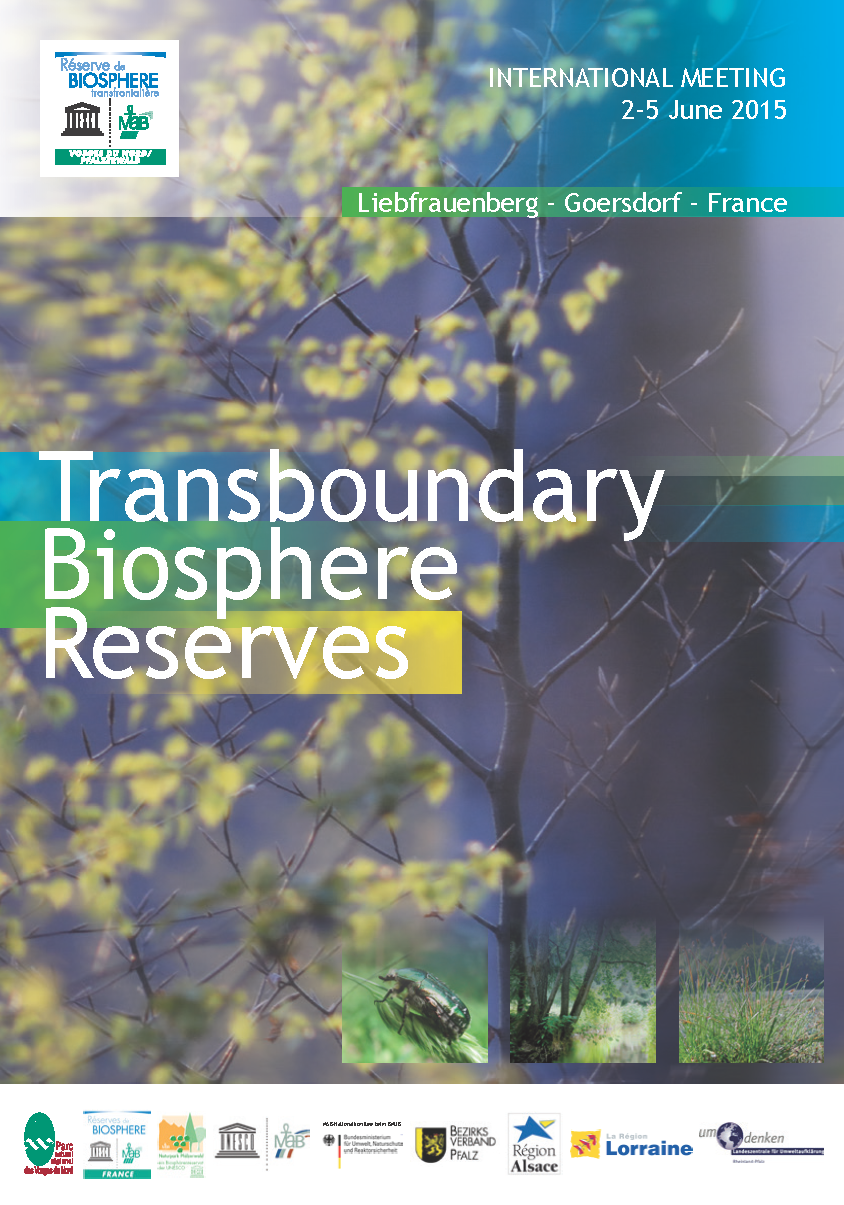
Read the report : here
Climate scientists, ecologists and scientists of all kinds have been warning us. Our planet is getting warmer, ecosystems are deteriorating, and biodiversity is collapsing.
To improve the relationship between humans and nature on a scientific basis and at a global level, in 1971, Unesco created the Man and the Biosphere (MAB) programme.
Learn more: MAB programme
Please click on the exhibition panel to enlarge the picture.
Research in the Biosphere reserves must find its place in national and international research programmes and also meet the concrete, and at times, immediate needs of those involved in management. Is it possible to develop research strategies in these conditions? How can the gap between scientific production and themes linked to territorial and resource management be bridged? The French Biosphere reserves network is currently exploring these topics.
A role game to encourage debate in the Cévennes
As part of the SECOCOCO project, a role-playing game was designed and conducted on Mont Lozère, in the Cévennes Biosphere Reserve. This game, developed thanks to the Commod approach, focuses on the link between agricultural practices and landscape, in particular the practices of removing and turning over grasslands. Its purpose is to promote debate among stakeholders on the antagonisms and synergies between ecosystem services associated with these practices (forage production, aesthetic and heritage value of landscapes, tourism activities, water quality, the existence value of biodiversity).
This game was animated on the Mont Lozère site with Park agents, breeders, elected officials and tourist service providers. The tool makes it possible to open the debate on the need and difficulty of combining the different issues at stake in a given territory (agriculture, tourism, biodiversity, water and landscape) and on the importance of a concerted approach, in line with the principles of the MAB programme.
International cooperation
The French MAB committee proposes to contribute to educational actions for the Biosphere Reserves by organizing study trips, meetings and exchanges. Training courses will be offered on varied topics; they are custom designed upon request by the national MAB or Biosphere Reserve committees, in connection and complementarity with the Agence Française pour la Biodiversité.
With the backing of its network of researchers and managers, MAB France can also participate in support missions (when biosphere reserves are created or periodically examined, focusing on the management of biosphere reserves, in particular cross-border reserves), and project evaluation.
Training the coordinators of the Jabal Moussa Biosphere Reserve, in Lebanon
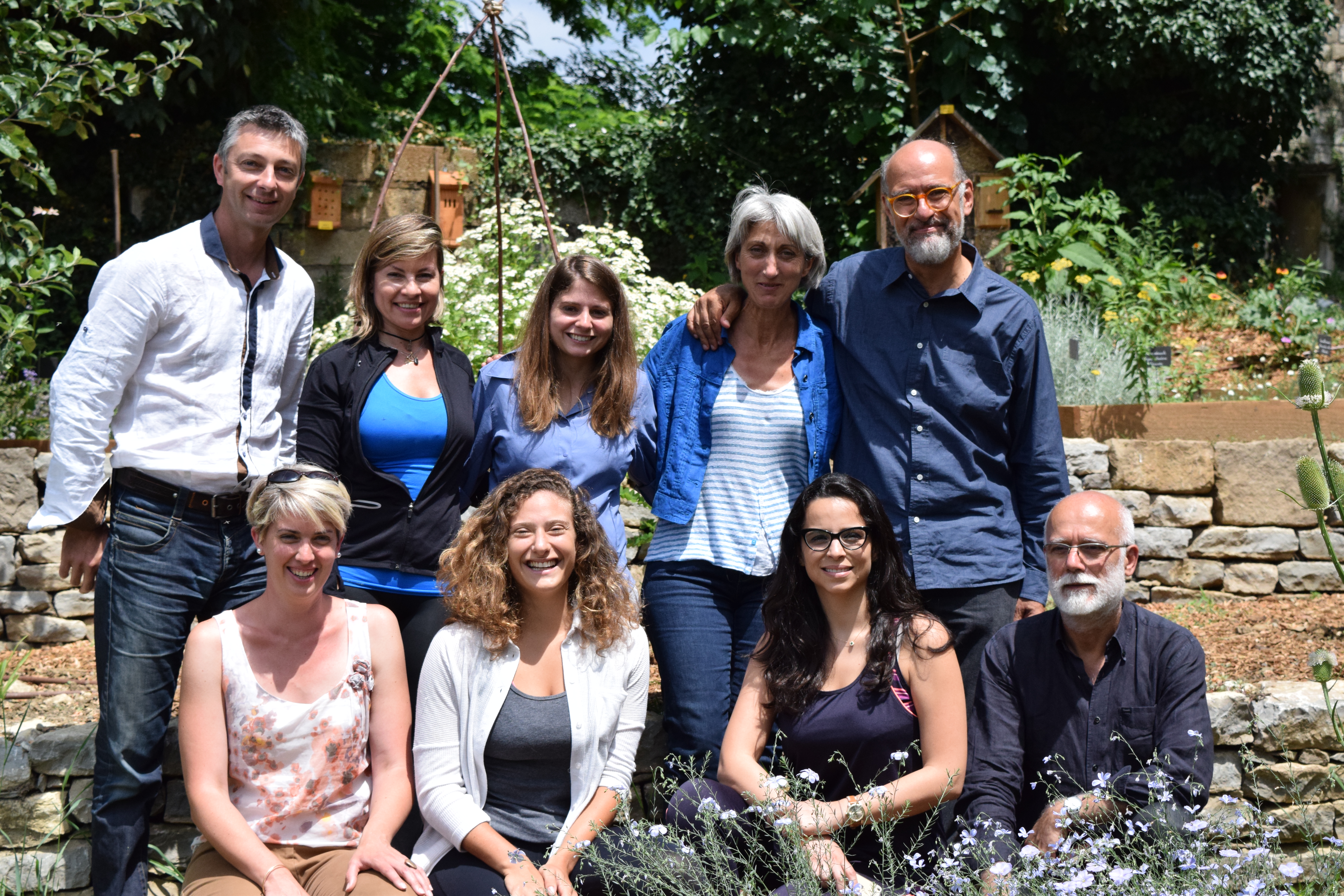 A 4-day training course was organized in June 2016, for five members of the Jabal Moussa Protection association, a Biosphere Reserve in Lebanon. Meetings alternated with discussions with stakeholders (managers, technicians, public representatives, socio-professional groups) and field outings in three Mediterranean Biosphere Reserves: Camargue, Cevennes (Galeizon Valley) and Gorges du Gardon.
A 4-day training course was organized in June 2016, for five members of the Jabal Moussa Protection association, a Biosphere Reserve in Lebanon. Meetings alternated with discussions with stakeholders (managers, technicians, public representatives, socio-professional groups) and field outings in three Mediterranean Biosphere Reserves: Camargue, Cevennes (Galeizon Valley) and Gorges du Gardon.
The main themes were related to governance, management of mixed ownership territories, organizational arrangements for local participation, incentives for the stakeholders to promote sustainable development (eco-stakeholders), ecological camping and communication with other Biosphere Reserves. These multiple exchanges also assessed the management of central areas, education and educational games, as well as sustainable tourism.
Backing the creation of a first Biosphere Reserve in Moldova
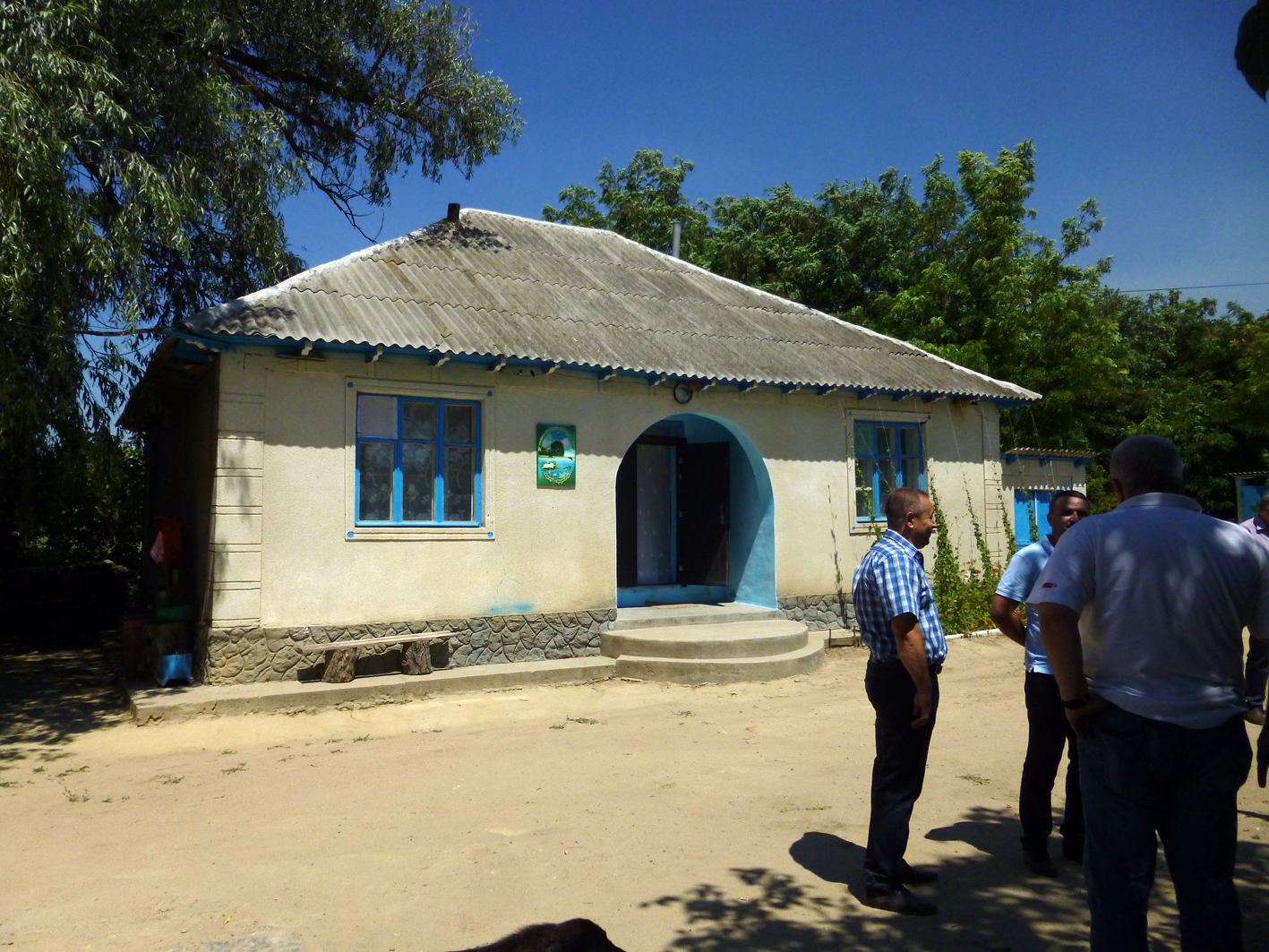 At the request of the Moldovan government, MAB France is supporting the creation of the first Biosphere Reserve in this country. It concerns the Prut River and the associated wetlands, which form the border between Moldova and Romania. Moldova has already carried out extensive awareness work so that local communities are involved in this project, which they see as a lever for local development. Structures, such as a reception and educational centre, are currently under construction. This site is part of a vast wetland complex associated with the Danube Delta.
At the request of the Moldovan government, MAB France is supporting the creation of the first Biosphere Reserve in this country. It concerns the Prut River and the associated wetlands, which form the border between Moldova and Romania. Moldova has already carried out extensive awareness work so that local communities are involved in this project, which they see as a lever for local development. Structures, such as a reception and educational centre, are currently under construction. This site is part of a vast wetland complex associated with the Danube Delta.
Supporting a transboundary Biosphere Reserve project
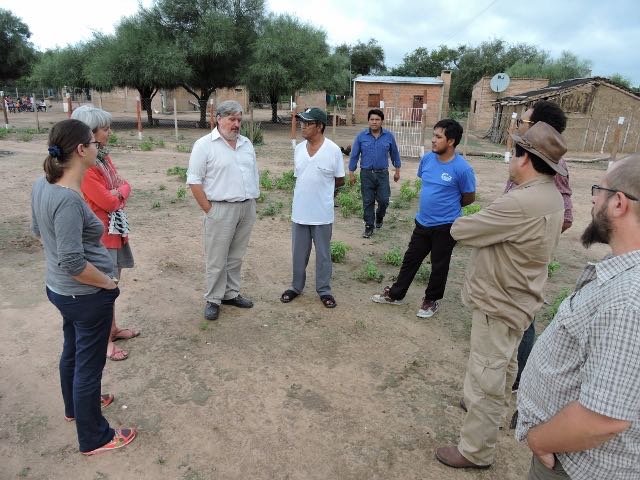 As part of an FFEM project, MAB France is providing technical support for setting up a Transboundary Biosphere Reserve in Pilcomayo Basin. Catherine Cibien participated in a study trip at the site and met the project leaders. In addition to meetings with the project leaders, a study trip is organized in two Transboundary Biosphere Reserves (Vosges du Nord – Pfälzerwald and Monte Viso) in order to discuss concrete projects with public representatives and managers and to study governance arrangements.
As part of an FFEM project, MAB France is providing technical support for setting up a Transboundary Biosphere Reserve in Pilcomayo Basin. Catherine Cibien participated in a study trip at the site and met the project leaders. In addition to meetings with the project leaders, a study trip is organized in two Transboundary Biosphere Reserves (Vosges du Nord – Pfälzerwald and Monte Viso) in order to discuss concrete projects with public representatives and managers and to study governance arrangements.
Watch the video Pilcomayo: dinamica fluvial...
MAB France’s Pedagogy group promotes and develops educational activities in sustainable development in Biosphere Reserves. It brings together a range of competencies – teachers from the national education system and agricultural colleges, other providers of educational services, representatives from various associations and elected representatives of Biosphere Reserves. It allows members to exchange methods and experience, develop educational activities using resources from the reserves, and establish joint projects involving multiple reserves.
Participatory science programmes are highly suited to Biosphere reserves, where the convergence of research and knowledge of the area, as well as involvement of residents, promote sustainable management. These programmes allow people to participate in the ongoing monitoring of their environment, and scientists to identify and analyse large amounts of data useful for managing and developing the Biosphere reserve.
Involving non-specialists necessitates a pedagogical approach combined with scientific accuracy. This can be done by developing rigorous but simple protocols for data collection. To motivate people, it is essential to make the connection with land management and to make sure they see the results of their participation without delay.
Wishing to promote national participatory science programmes, MAB France has signed agreements with a number of citizens. It also encourages French Biosphere reserves to develop their own participatory science programmes for their areas.
The long-term scientific monitoring of territories, their biodiversity and human activities is one of the fundamental missions of biosphere reserves. In a changing world, observatories offer standardized data to assess the dynamics at work. They make it possible to perpetuate and disseminate global or thematic information. This data is useful to researchers, but also to managers and decision-makers. Their accessibility is therefore essential.
The Observatory of the Vosges du Nord-Pfälzerwald Transboundary Biosphere Reserve
Geographic Information Systems (GIS) have led to a real revolution in the use of cartographic data. The Transboundary Biosphere Reserve was early equipped with this interactive decision-making tool for land use planning, management and protection of nature, cultural heritage, tourism enhancement and socio-demographic analysis.
To be seen : Interactive mapping
All MAB stakeholders meet at world congresses: Minsk 1983, Seville 1995, Madrid 2008, Lima 2016. Each congress produces a strategy and/or action plan, a roadmap for the global network.
International Co-ordinating Council (ICC) of the Man and the Biosphere (MAB) Programme
The MAB International Coordinating Council is the main governing body of MAB, comprising 34 Member States. France is currently one of them. It meets annually, approves new biosphere reserves, carries out periodic reviews and takes decisions on the programme.
Learn more: ICC
EuroMAB
France is involved in the EuroMAB regional network. It includes 292 biosphere reserves and MAB committees in the "Europe and North America" region, representing 37 states.
It promotes exchanges at conferences every 2 years. A place of inspiration and intense emulation for the managers, researchers, elected officials or administrative staff who participate in it, the workshops encourage collaborative actions on various themes: how to enhance the value of local actors engaged in sustainable approaches, participatory governance, adaptation and mitigation of climate change, connecting humans to nature and well-being, strengthening scientific and academic cooperation, management of urban sites, etc. The countries are successively candidates for organizing these meetings.
Lear more: EuroMAB
In 2017, France welcomed EuroMAB to the Dordogne Basin Biosphere Reserve. On this occasion, she proposed the establishment of cooperation on rivers.
Learn more: EuroMAB 2017
EuroMAB 2019 will take place in Ireland in the Dublin Bay Biosphere Reserve.
Lear more : EuroMAB Dublin 2019
Edu-BioMed
MAB France is a partner in an Erasmus+ project run by the Autonomous University of Barcelona from 2018 to 2020. It concerns capacity building for education and research in Mediterranean Biosphere Reserves.
It aims to establish connections between higher education institutions and biosphere reserves in 4 Mediterranean countries (Lebanon, Morocco, Spain, France), to strengthen knowledge sharing between these institutions of a different nature. The main objective is to set up a "knowledge circuit" between and within these organisations in the different countries, strengthening relations between higher education institutions and all socio-economic actors. Learn more: Edubiomed
Website editor
The mab-france.org website is published by MAB France.
Head office :
24 chemin de Borderouge, CS 52627 Auzeville
31326 Castanet Tolosan Cedex
France
Director of publication : Didier Babin
Personal data
In accordance with the french law n°78-17 of 6 January 1978 relating to data processing, files and freedoms, the Internet user has the right to access, modify, rectify and delete data concerning him/her.
To use this right of access, please send a letter to :
MAB France
Catherine Cibien
24 chemin de Borderouge, CS 52627 Auzeville,
31326 Castanet Tolosan Cedex, France
Intellectual property rights
The presentation and each of the elements, including the logos and domain names appearing on the http://www.mab-france.org website, are protected by the laws in force on intellectual property, and belong to MAB France or are subject to authorisation for use.
No element of the http://www.mab-france.org website may be copied, reproduced, modified, republished, distorted or distributed in any way whatsoever under any medium whatsoever, even in part or in whole, without the prior authorization of the director, with the exception of strict use for private purposes or for the needs of the press, and subject to respect for intellectual property rights and any other property rights mentioned.
Any total or partial representation of the http://www.mab-france.org site, by any means whatsoever without the authorization of MAB France is prohibited and would constitute an infringement punishable by articles L335-2 and following of the intellectual property code.
Credits
Graphic and ergonomic design - technical development
Valactive
28, rue du Fer à Moulin
75005 Paris
Tél +33 (0)6 64 27 20 80
Contact : Sophie TaMinh et Valéry Frisch
www.valactive.com
GDPR
Only the email address is saved in the databases. It is only used to send out the "Biosphere Letter" four times a year and upon registration by the Internet user.
The latter can unsubscribe at any time
- by a link at the bottom of the letter
- by sending an email to contact[at]mab-france.org
Biosphere reserves help find local solutions to global challenges. To do this, they trial and adjust Unesco’s sustainable development goals through concrete, collaborative and replicable projects. These goals provide guidance for achieving a better future. They address global challenges we all face. The interconnected goals need to be achieved by 2030 if we are to ‘end poverty, protect the planet and ensure all people enjoy prosperity’.
Please click on the exhibition panel to enlarge the picture.
The agroecological transition implies major changes at the level of exploitations, branches and territories. It is an issue for several Biosphere Reserves, with food linking ecosystem and human health. A series of scientific workshops involving researchers, managers and stakeholders from Biosphere Reserves is being organized to present and discuss the concepts and methods underlying the transition in the agroecological domain. It is a question of analysing the drivers, barriers and opportunities present in the territories. In addition, scientific conferences and debates for the general public or a professional public are proposed to the Biopshere Reserves who wish to do so.
The objective of the Forestry Group is to facilitate communication and the sharing of experiences between partners involved in the conservation and management of forests in biosphere reserves, in order to achieve optimal management of forest lands. It aims to encourage projects, particularly at the research-management interface.
The French MAB Committee was established to oversee the Man and the Biosphere programme in France, with the support of the French Agency for Biodiversity. Managing and strengthening the national network of Biosphere reserves, the Committee liaises and develops collaborations with both French and international communities interested in the programme (e.g. scientific, educational, management and conservation of biodiversity).
Managing the network of Biosphere reserves
- MAB facilitates the exchange of experience and information, as well as developing joint projects between Biosphere reserves by creating and managing cross-cutting networks
- Biosphere reserves annual meetings
- Thematic groups: Pedagogy Group, Forest Group, Communications Group, Charter Group
- Participation in university courses
- Produces and disseminates information on Biosphere reserves: the French ‘Biosphere Letter’, fact sheets on Biosphere reserve activities (pdf), Biosphere reserves general fact sheets (pdf), Biosphere reserves technical notes, a practical guide to management, the website Agir pour la biodiversité (Act for biodiversity), etc.
Strengthening the French network of Biosphere reserves
- MAB France assists in the creation of new Biosphere reserves
- Supports French biosphere reserves during the periodic reviews conducted every 10 years
- Provides scientific and technical support to the network of Biosphere reserves and participates in their various bodies.
Developing international collaborations
The MAB Committee and French Biosphere reserves actively participate in the regional EUROMAB network that includes the MAB committees and Biosphere reserves of Europe and North America. The network meets regularly, organizes training courses and the exchange of best practices and experience.
Other collaborations exist, including with Biosphere reserves in French-speaking Africa. Many French Biosphere reserves have lasting partnerships with sites overseas.
Territories committed to sustainable development and biodiversity
We are already committed to
- We encourage dialogue between residents, elected officials, associations, public and private socio-economic actors
- We promote permanent interactions between researchers, managers and users of territories and the world of education
- We develop and disseminate methods of governance and participatory management of territories
- We encourage actors of positive change and approaches to progress: Biosphere Reserve Trophies, eco-actors' charters,.....
- We facilitate and support interdisciplinary research related to territorial issues through the co-construction of projects between research teams and managers, and the dissemination and valorisation of results
- We participate in civic education and training, in particular through the MAB Master's degree (University of Toulouse), its promotion abroad under the auspices of a UNESCO Chair and we participate in many university courses
- We bring our expertise to international projects to create or strengthen Biosphere Reserves.
Our objectives
Reinforcing the implementation of all the sustainable development aims in the Biosphere Reserves
- Continuing to promote new adaptive governances
- Supporting and accompanying local exemplary initiatives
- Promoting and expanding the Biosphere Reserve trophies
- Strengthening the network of eco-players, in France and beyond
- Contributing to ambitious research programmes in the territories, in order to evaluate social interdependencies and the contribution of nature to human well-being.
Multiplying and disseminating our knowledge and practices for the social and ecological transition
- Establishing a wide-reaching and effective communication strategy, based on the worldwide MAB strategy
- Invigorating and developing the current Biosphere reserve network in metropolitan and overseas France, as well as across the borders
- Helping to exchange experiences between model territories in France and throughout the world
- Supporting new international projects with our expertise
- Summarising, publishing and sharing our knowledge through introductory and professional training.
Finding the appropriate resources to work effectively for nature and the future generations
- Reinforcing the national coordinating team of MAB France
- Strengthening the coordination resources of the Biosphere reserves. They lead the MAB programme on their territories, interacting with researchers, facilitating dialogue and broadening the scope of participation, and create links between their territories and the national and worldwide network
- Reinforcing, diversifying and expanding our technical and financial partnerships: elected representatives, national institutions, public and private companies, French and international NGOs.
Our strengths
- Adapting the Biosphere Reserves’ governance modes to local social, economic and ecological contexts
- Looking for local solutions to worldwide issues, through dialogue and participation, based on the understanding and respect of cultures
- Working with researchers in sustainable sciences
- Mobilizing socio-economic players who can bring about change
- Involving the young generation in our governance, as they are the driving force behind the ecological and social transition, through the Co’MAB association
- Drawing on skills from other countries through exchanges in the worldwide network.
The Members of the MAB France Association
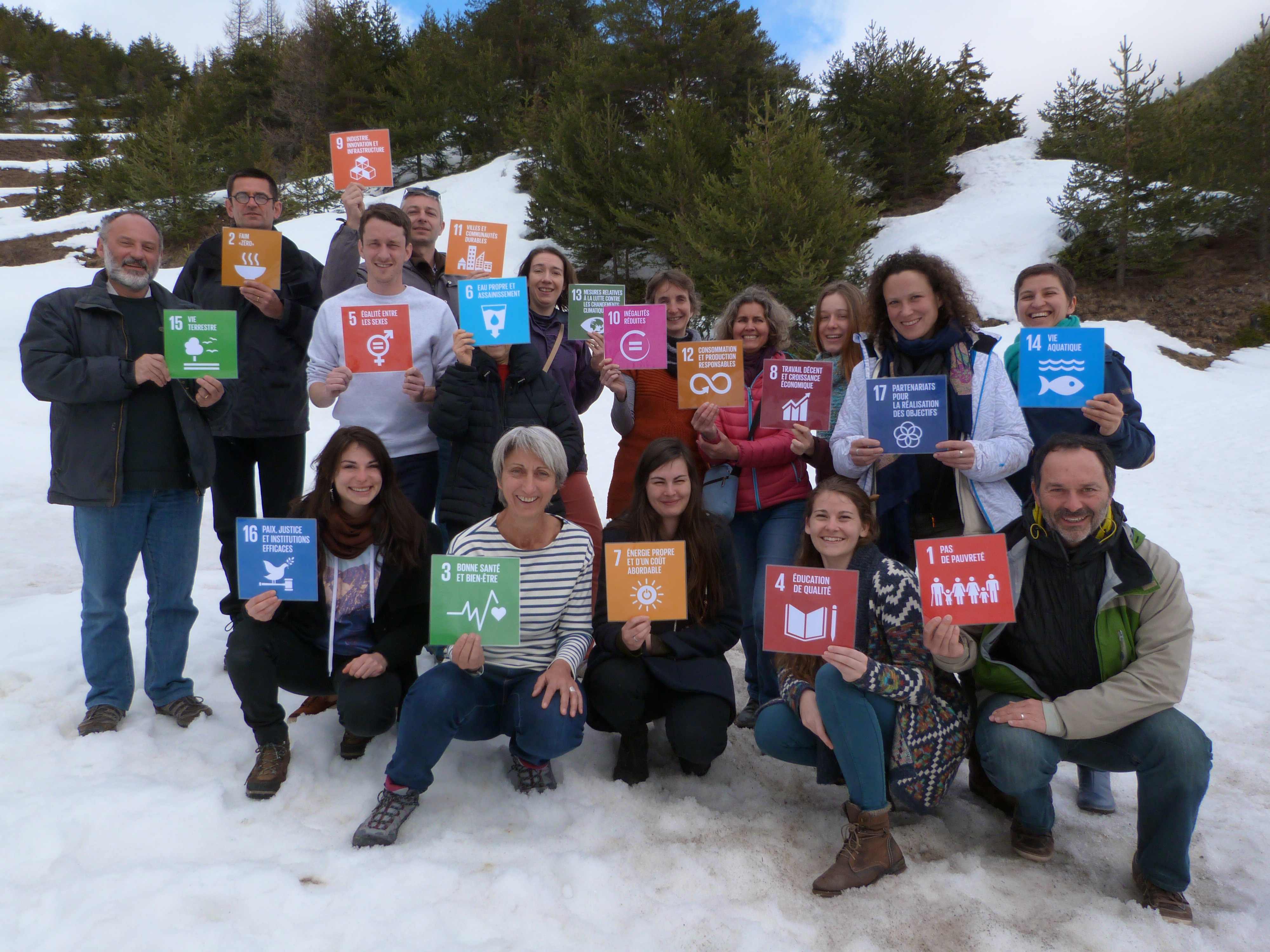
The association brings together individuals and legal entities. The person designated by the Ministry in charge of Foreign Affairs, which represents France on the International Coordinating Council, Didier BABIN, is an ex officio member. People involved in the programme (scientists,...) also belong to the association.
Research and Academic Institutions
- CNRS
- (French National Centre for Scientific Research)
- INRA ( French national Institute for Agricultural Reserch)
- MNHN (National Museum for Natural Hystory
- Cirad(Agricultural Research for Development)
- IFREMER National Institute for Ocean Science
- IRD French national Institute for sustainable development
Supporting bodies of Biosphere Reserves
National Parks, Regional Nature Parks, mixed syndicates
And
Other associations, companies, researchers ans stakeholders, anyone interested in the Man and Biosphere programme... that share our values
Our partners
Biodiversity management and cooperation bodies support our actions:
The French Biodiversity Agency, AFB- is the main support that has accompanied MAB France since its creation. Financial support and support for actions that meet the objectives of the AFB.
The Ministries of National Education formerly and the Miniqtry of Research and Higher Education support actions related to education for sustainable development.
Work in progress
- Acknowledge the vision and principles of the MAB Programme;
- Endorse the values, operating principles and missions of Biosphere Reserves;
Join the MAB France association and support its actions
COLLAB 2
Sustainability sciences aim to find solutions to the environmental challenges Society is facing. Therefore, this main goal calls for action. This implies that researchers need to collaborate between disciplinarities (interdisciplinarity) on complex topics (such as social-ecological systems, territories...) and with a diversity of non-academic stakeholders (transdisciplinary collaboration).
The COLLAB2 project aims to get a better understanding of these collaborations. The researchers of the project use three different objects of study for their research: Biosphere Reserves, Human-Habitats Observatories, and the "Zones Ateliers" (workshop areas) of CNRS. The COLLAB2 project end goal is to help researchers and partners to understand the factors, processes, trajectories and potentials of transformation of their collaboration, on top of identifying and overcoming the difficulties these collaborations can bring. The project is composed of 18 people, among which a team of 11 researchers from different backgrounds (sociology, geography, ecology, biology) and from different structures (Universités, CNRS, INRAE). Seven key stakeholders have been closely engaged in the project, of which the Head of MAB France. They participate to meetings, they help designing methods and debate around the directions and results the project is taking along the process.
The project is funded by ANR 2019-2024 and uses methods of environmental sociology, sociology of sciences and potilical sociology.
Coordinator : Isabelle Arpin (INRAE).
Contact of the project at MAB France: Christine Hervé
To know more about the project, please click on this link: Collab2
Territorial ecology is an emerging interdisciplinary research field in France. Its origins can be found in both industrial ecology and urban ecology. Its main purpose is to better understand socio-natural interactions, particularly the material and energy flows linking society and nature. The description and the analysis of these flows – that is to say of the territorial metabolism – goes with the analysis of the social, political, economical, technical (and so on) underlying conditions. As a consequence, territorial ecology combines social sciences, environmental sciences, and engineering sciences.
Our reflections on ecosystem services aim to develop a definition, specific to Biosphere Reserves, of the interdependent relationships between humans and nature. The aim is to raise awareness of these interdependencies and to identify ways of taking better account of ecosystem functionalities that are beneficial to humans, both in management methods and in the individual choices made by citizens.
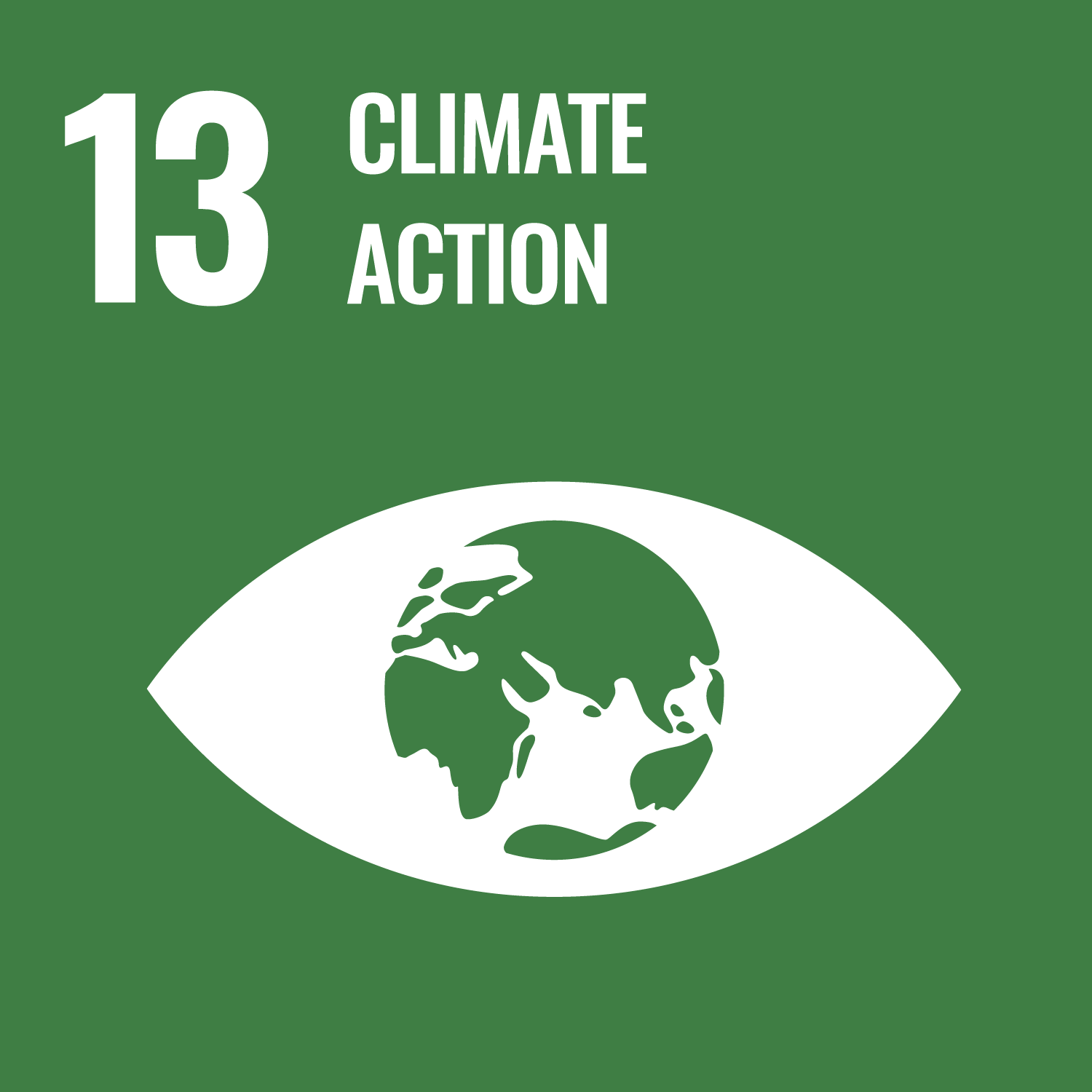
Human activities change the climate, leading to catastrophic phenomena (like storms, heat waves, rising sea levels, etc.) that we must combat. Reducing greenhouse gas emissions and anticipating and dealing with the natural consequences of climate change are two key challenges.
Please click on the exhibition panel to enlarge the picture
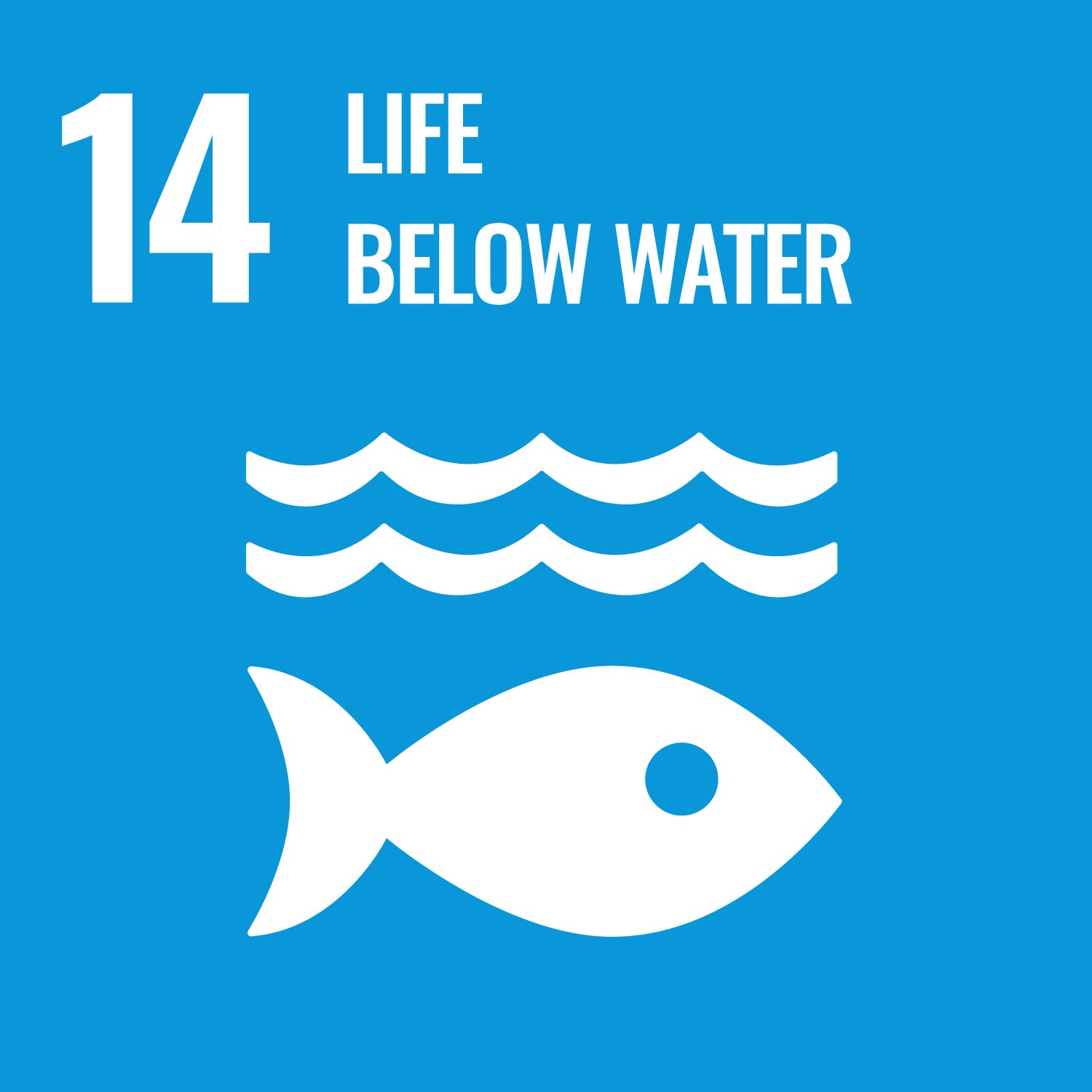
Our seas and oceans – precious from both ecological and economic standpoints – are threatened by human activities both directly (e.g. overfishing) and indirectly by their consequences (e.g. ocean acidification, global warming and pollution).
Various coastal and marine biospheres are working to promote sustainable fishing and protect biodiversity whilst conserving the oceans and coastlines.
Please click on the exhibition panel to enlarge the picture
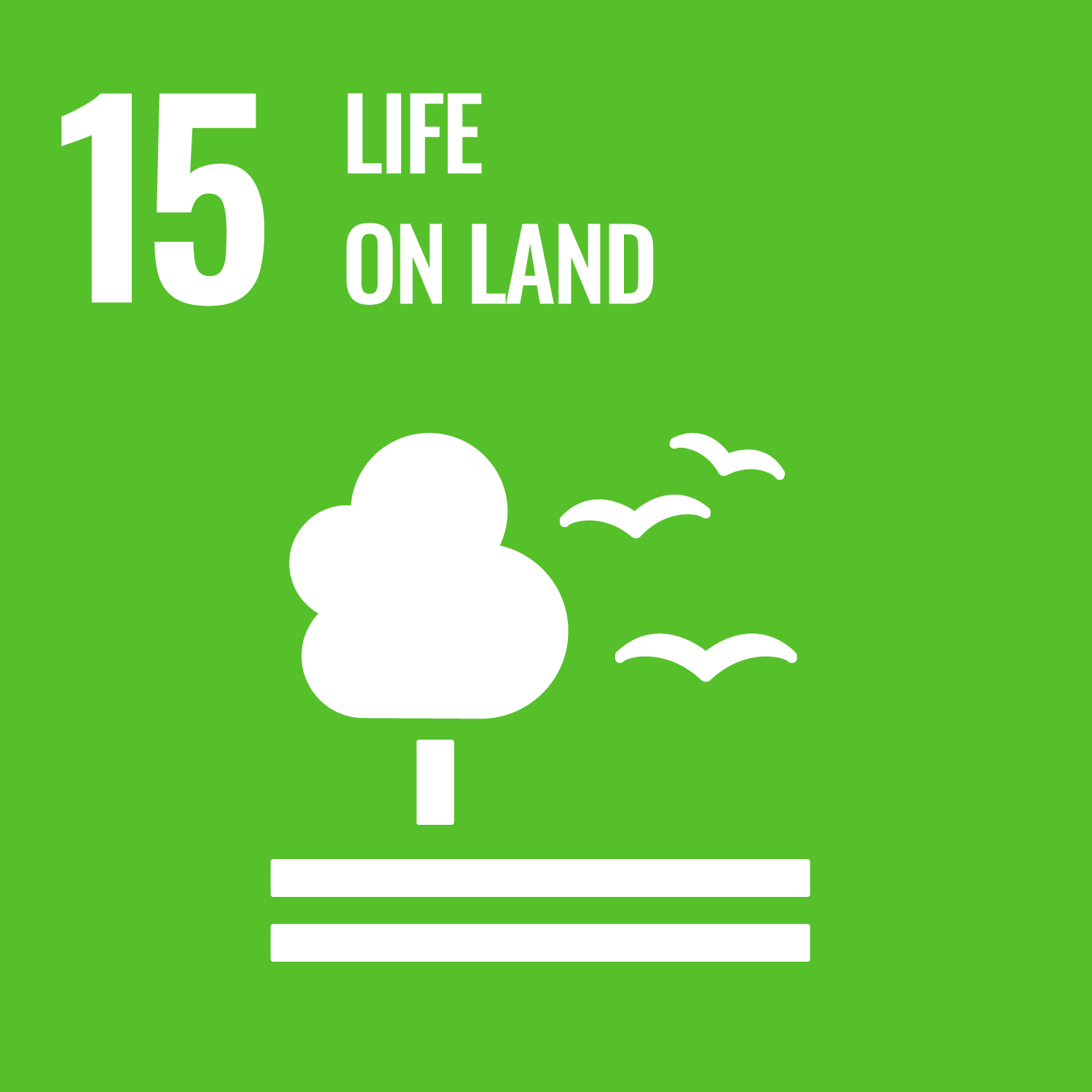
Terrestrial ecosystems are vital habitat for millions of species, and the services they provide are invaluable, including air filtration, the water cycle, health and well-being, and reservoirs of biodiversity. Their contributions are essential to us and our very survival.
While ecosystems are deteriorating at an ever-faster pace through desertification, expansion of cultivated land and urbanisation, biosphere reserves seek to conserve them.
Please click on the exhibition panel to enlarge the picture
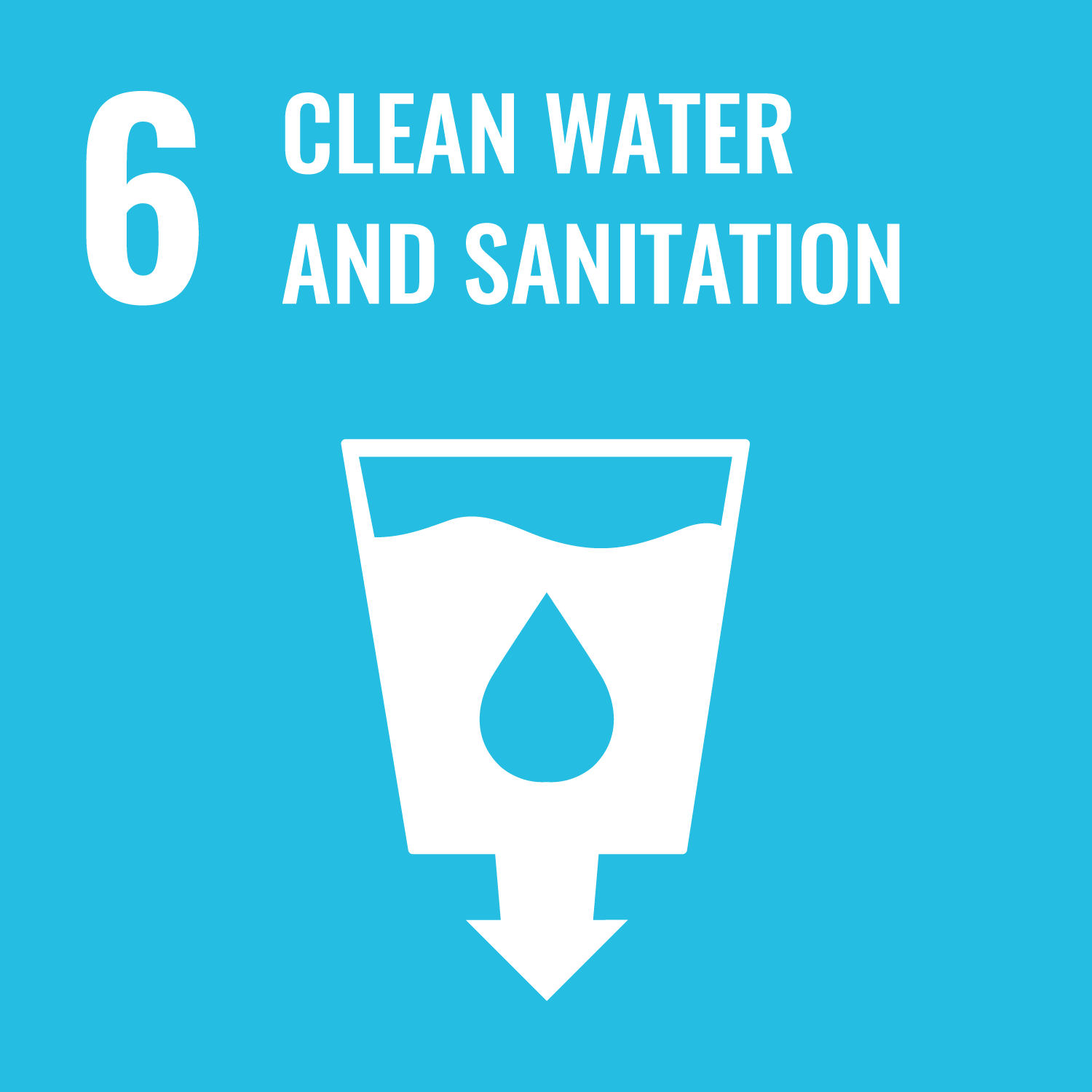
Being able to access water, sanitation and hygiene services is a basic human right. Yet 40% of the world’s population still lacks access to these basic services, and this figure is likely to increase as a result of climate change. Biosphere reserves seek to restore ecosystems and encourage sustainable activities that use water resources more efficiently.
Please click on the exhibition panel to enlarge the picture
Half of humanity lives in cities, and in 2050, it will be two thirds. Making these cities more secure, inclusive, resilient and sustainable is a matter of urgency. Cities within biosphere reserves have protected areas nearby, which provide fresh air and recreation, as well as a number of other ecosystem services (e.g. pollination, water quality, CO2 storage, etc.). They also mean additional economic opportunities, in ecotourism for example.
Please click on the exhibition panel to enlarge the picture
Over the next twenty years, the already great pressure on natural resources will increase due to consumption. If we are to avoid exhausting the planet, it is important to improve production and consumption standards to ensure we all have access to goods, whilst reducing waste and pressure on natural resources. All around the world, biosphere reserves have found creative ways of solving this problem.
Please click on the exhibition panel to enlarge the picture
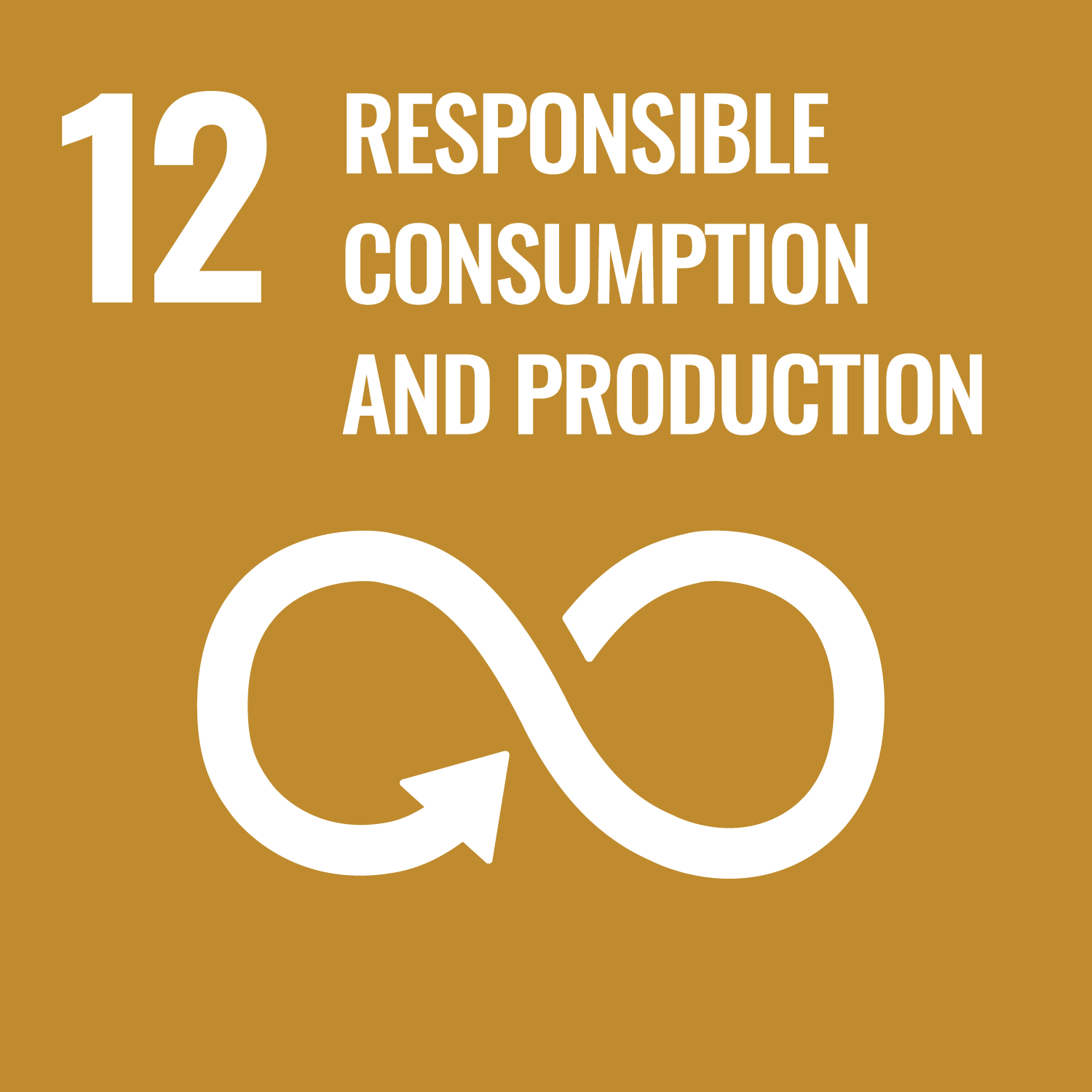
Famous for their summer cauliflower, the Audomarois marshes are an excellent place for vegetable production and grassland, thanks to the ever-present water and the agronomic quality of its peat-rich yet sensitive soil. The Programme for the Maintenance of Agriculture in Wetlands (PMAZH) aims to find a balance between viable, profitable farming activities and crucial conservation of the wetland area and its various ecological functions.
The programme provides support to market gardeners, for example, to reduce their use of insecticides, and teach them to make their own farm machinery, which boosts productivity and improves working conditions, while minimising the financial investment. As the techniques developed are based on local understanding, the aim is not to standardise practices, but to develop hyperlocal skills and knowledge in line with each farmer's needs.
Please click on the exhibition panel to enlarge the picture
Education is the cornerstone to achieving Sustainable Development Goals. It allows people to emerge from poverty, reduces inequalities and creates a climate of peace and tolerance in each society.
Please click on the exhibition panel to enlarge the picture
Companies, not-for-profit organisations and citizens committed to taking concrete actions to sustainably develop their activities are encouraged by biosphere reserves and recognised as environmental stakeholders. They join a network where they can share best practices and meet other professionals from the area, and sometimes unprecedented partnerships and even a few new friendships are born!
More than simply representatives of their local economy, environmental stakeholders are like ambassadors for biosphere reserves.
Please click on the exhibition panel to enlarge the picture

Productive employment and decent work play a key role in poverty reduction and achieving justice between people. Improved equality benefits entire societies, as more people are productive, contribute to the growth of their country and keep the peace. It also reduces unemployment, which is a driver of instability.
Please click on the exhibition panel to enlarge the picture
Since december 2020, MAB France offers new dialogue and informative online platforms through their MAB webinars, happening once a month. Every third thursday of the month at 2pm (Paris hour), join us to discuss about specific themes, keep the network going and test new methods of engagement together. These webinars are open to all, to Biosphere Reserves and beyond: Biosphere Reserve managers and every person involved and interested by the theme of the month. You can also contact us if you want to present or discuss about a specific theme.

